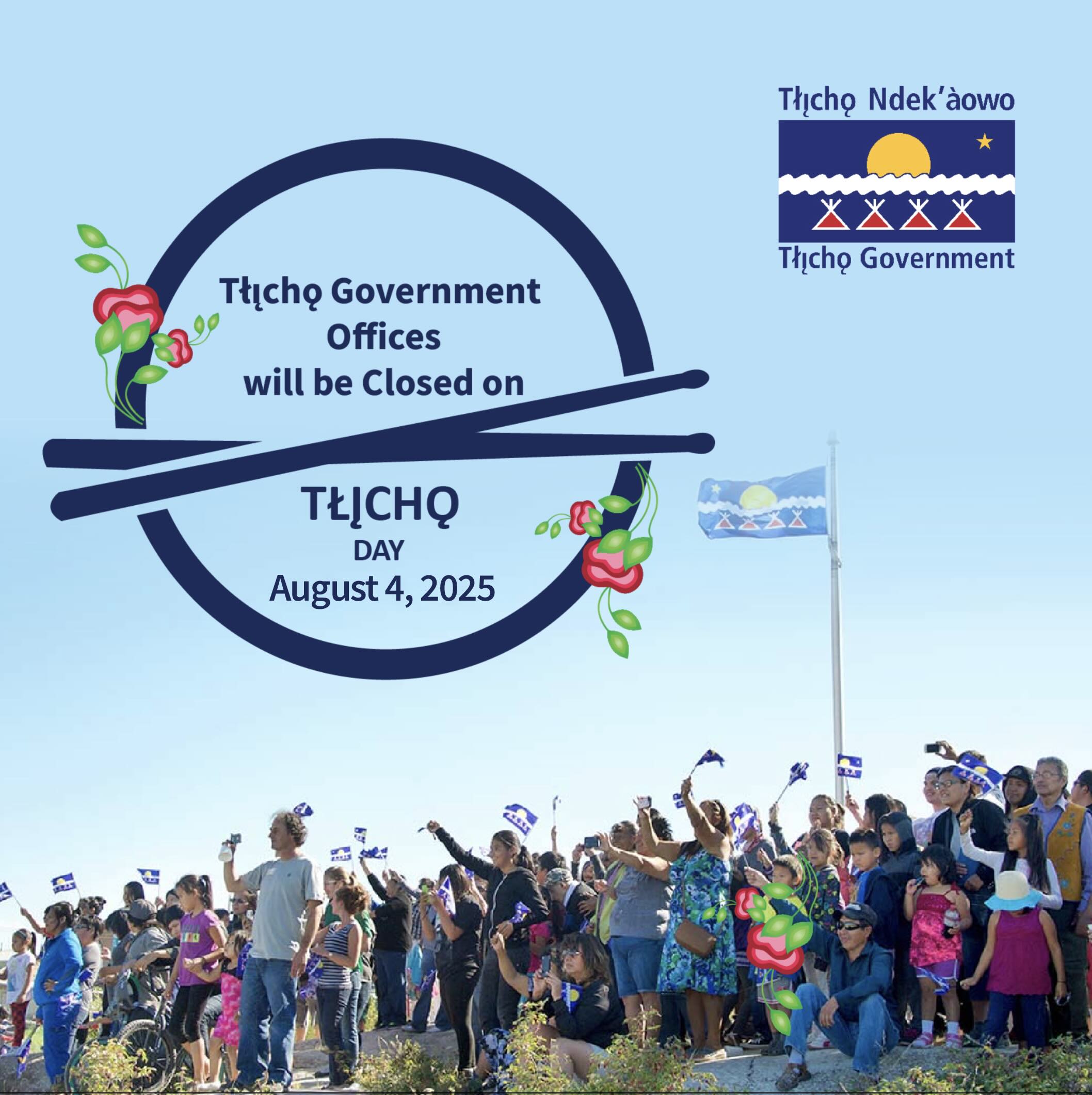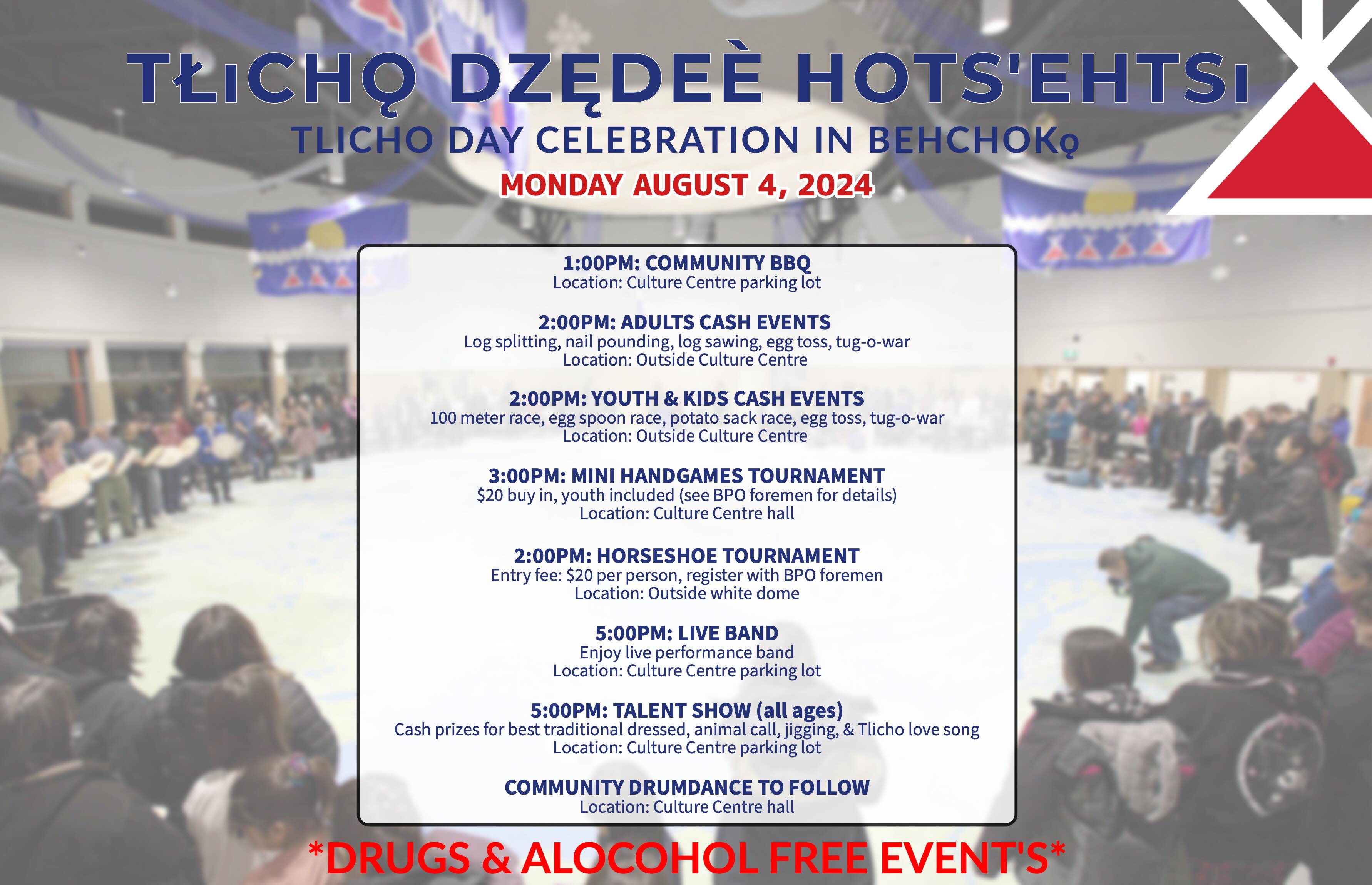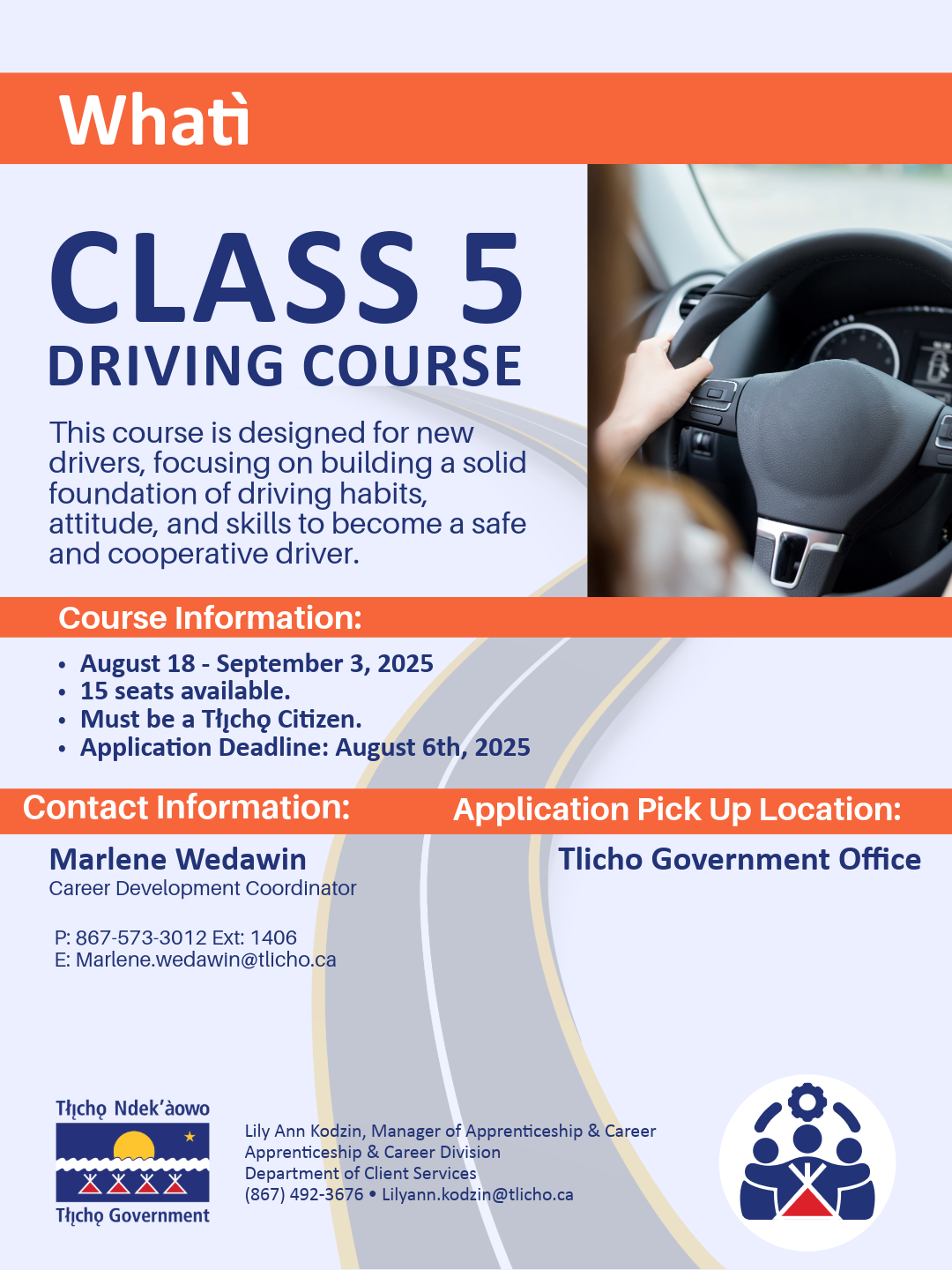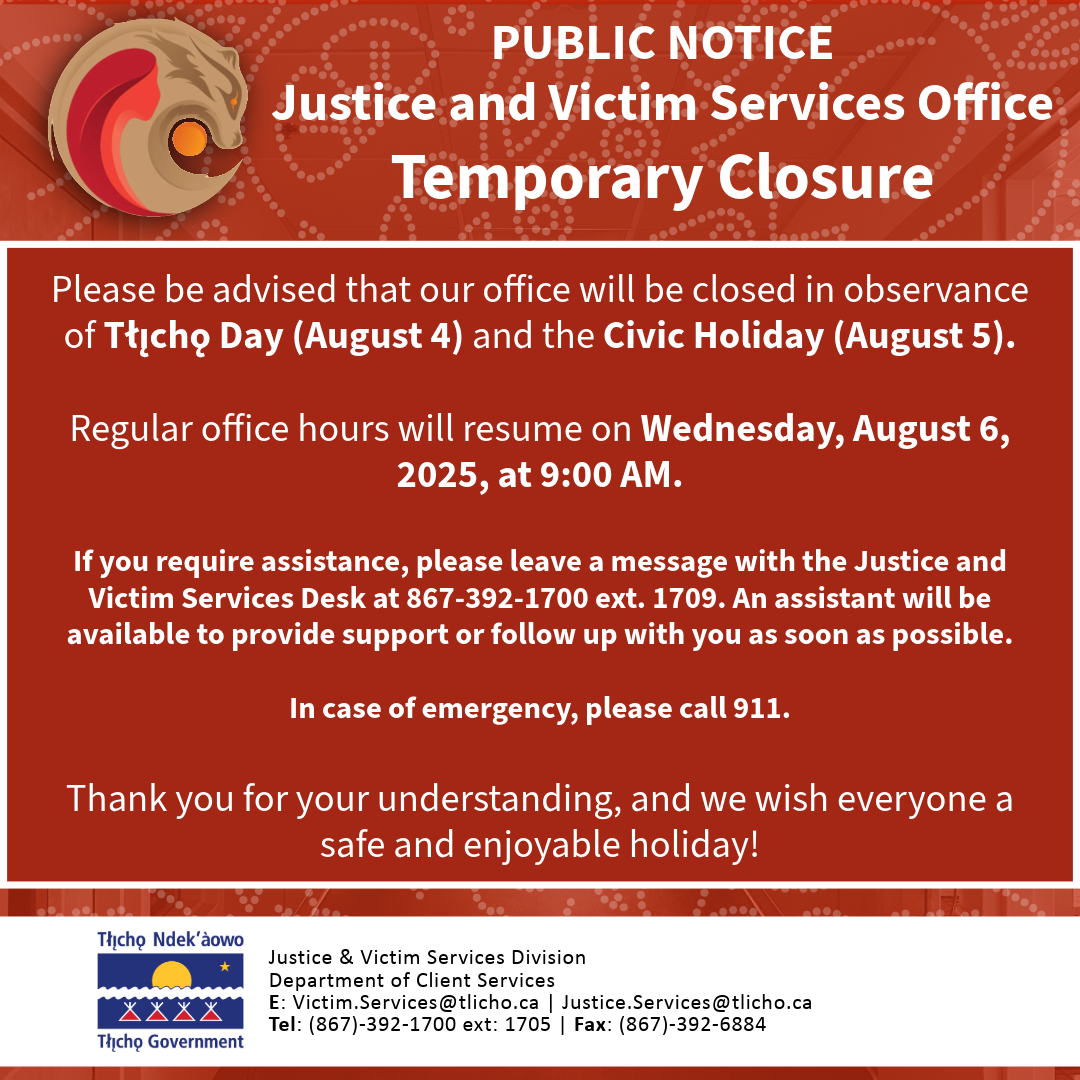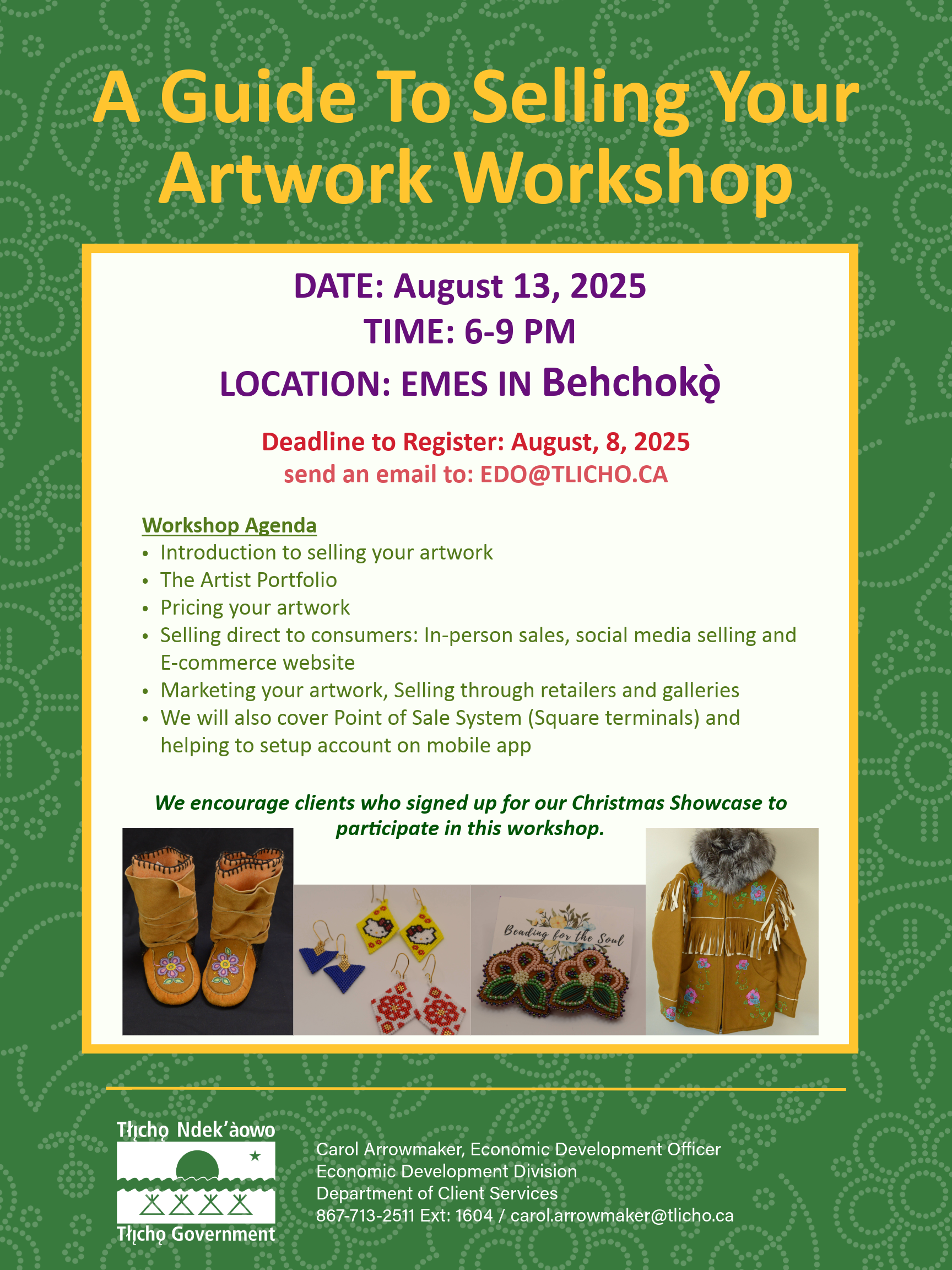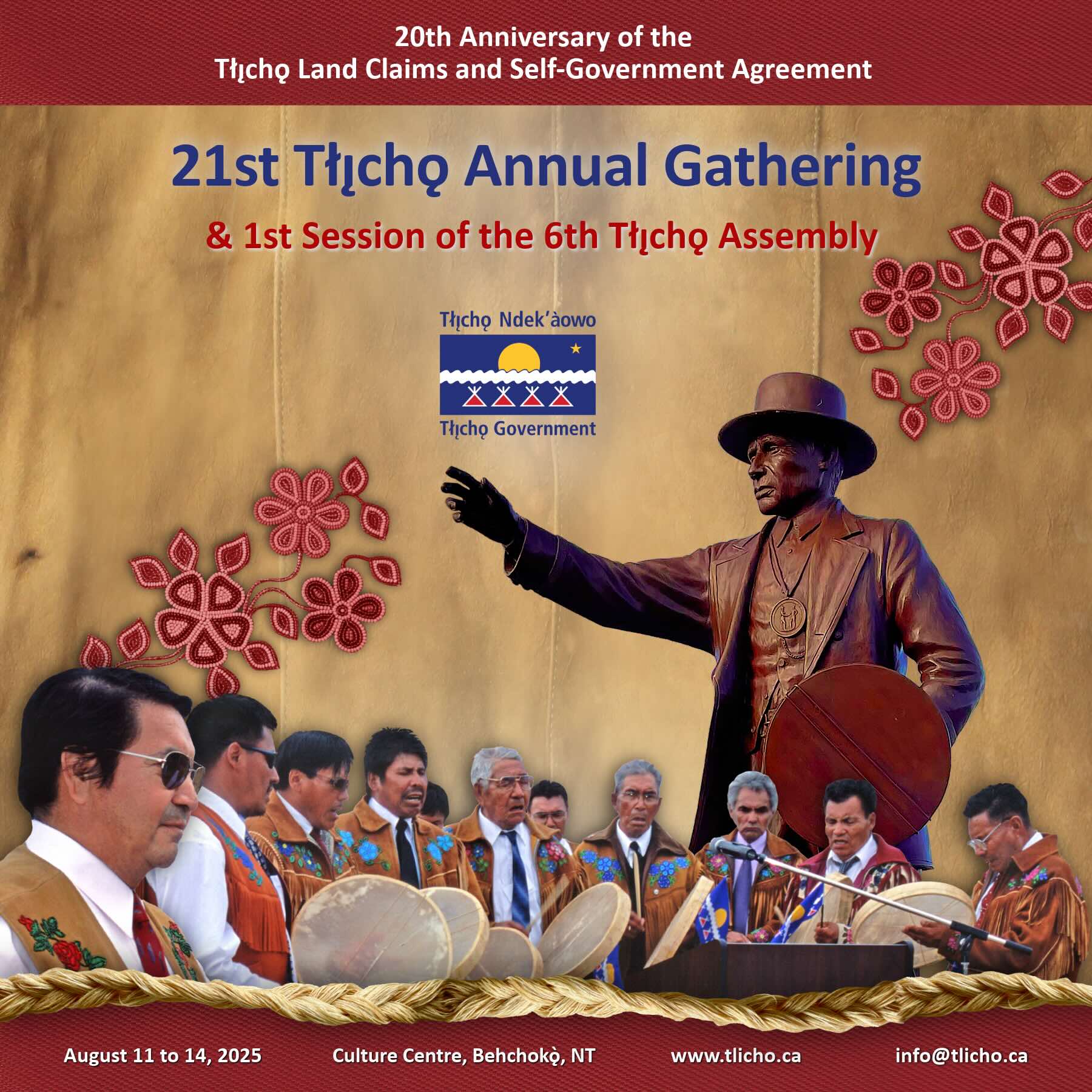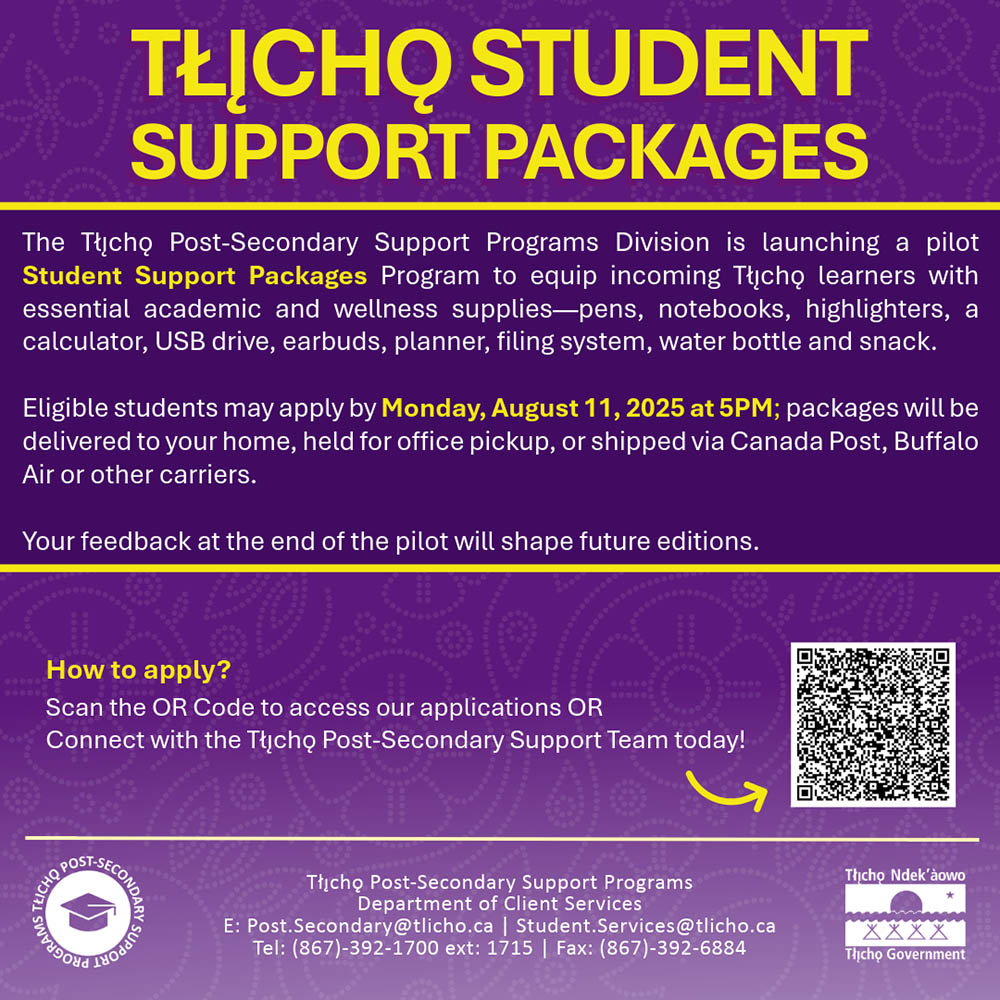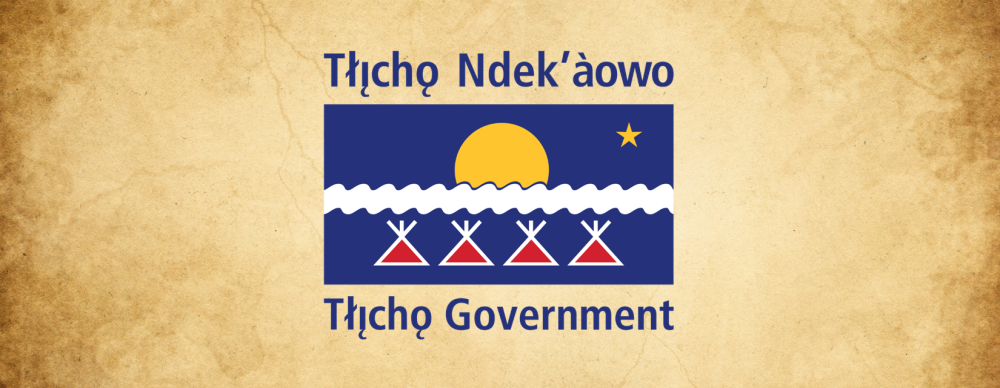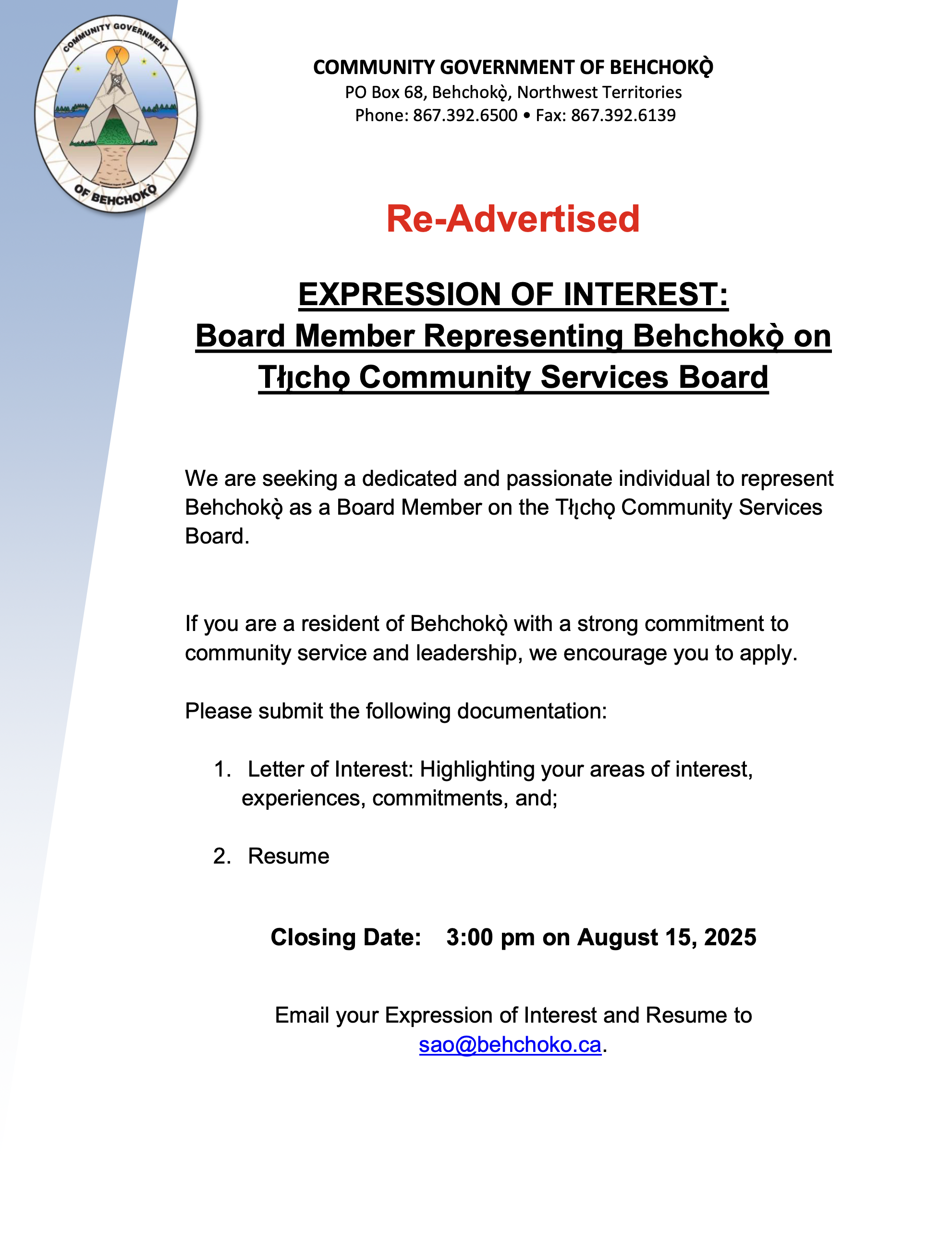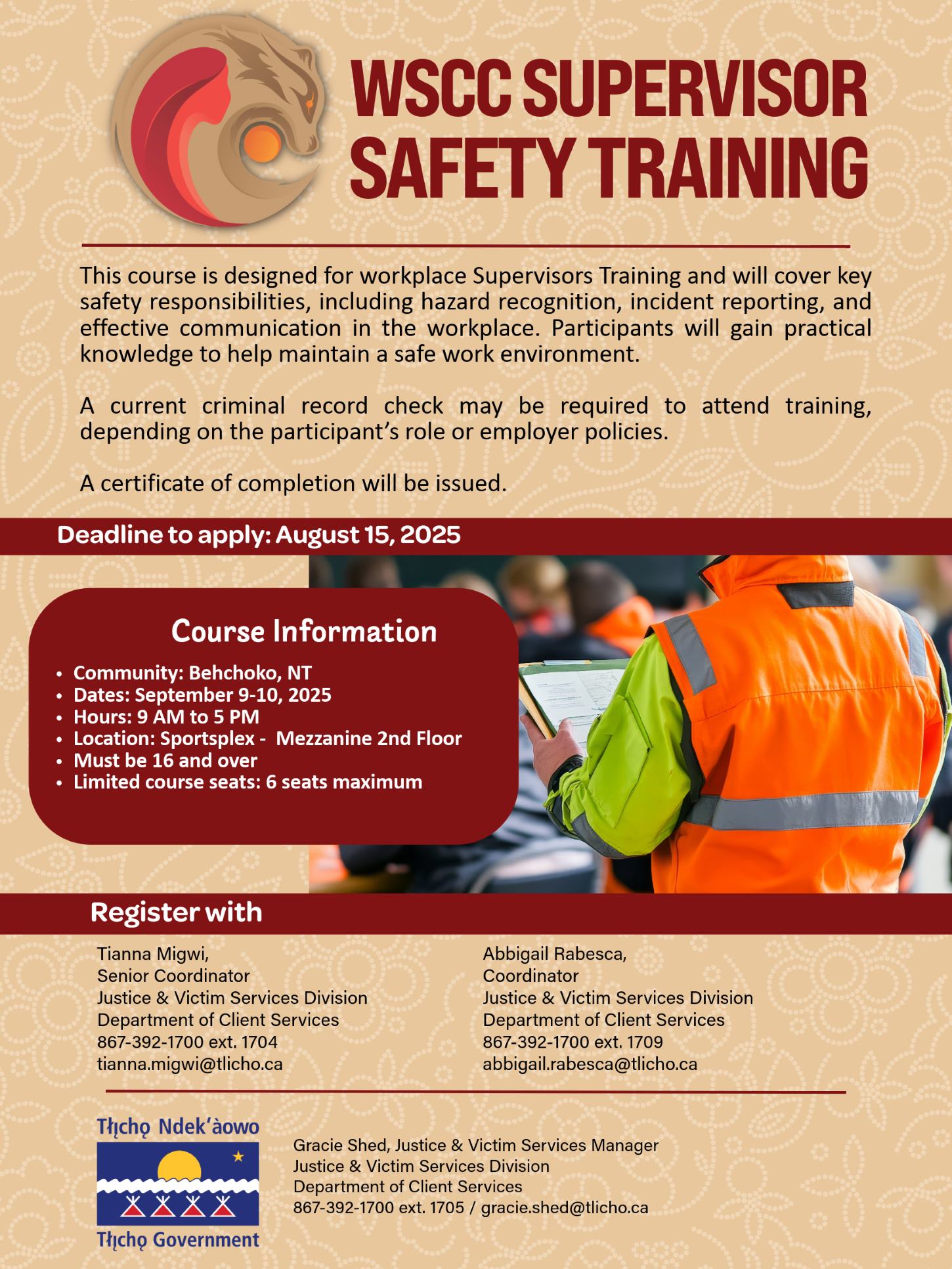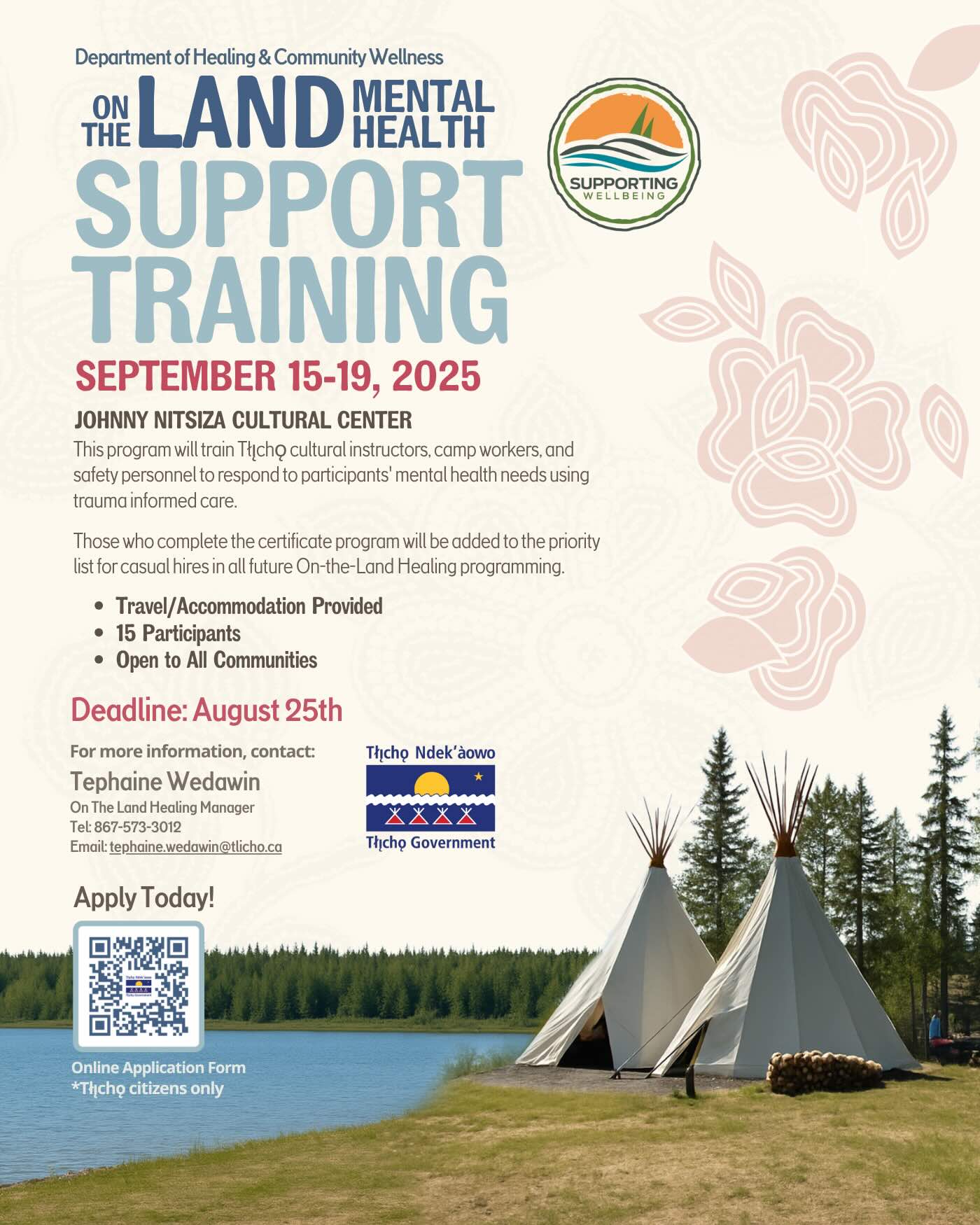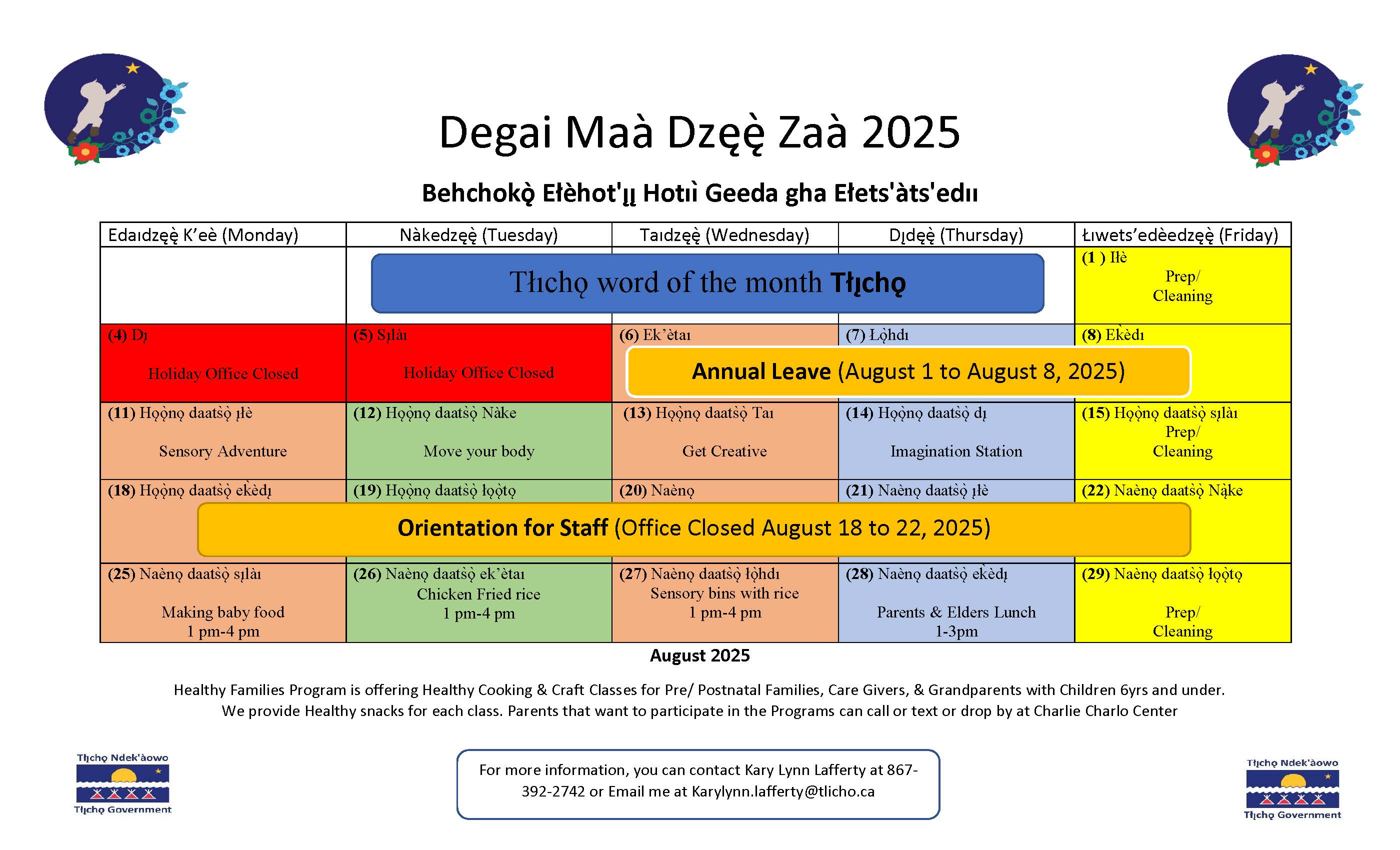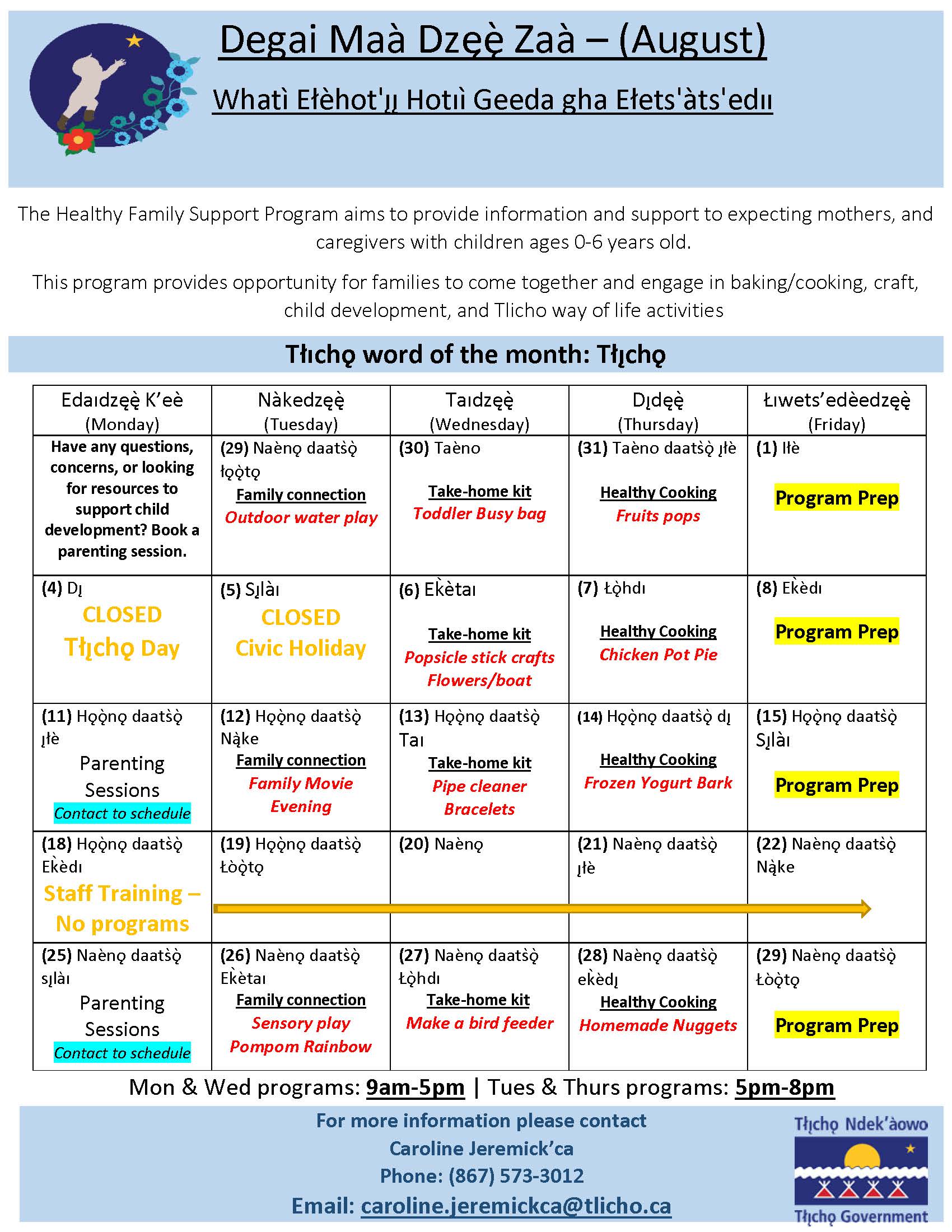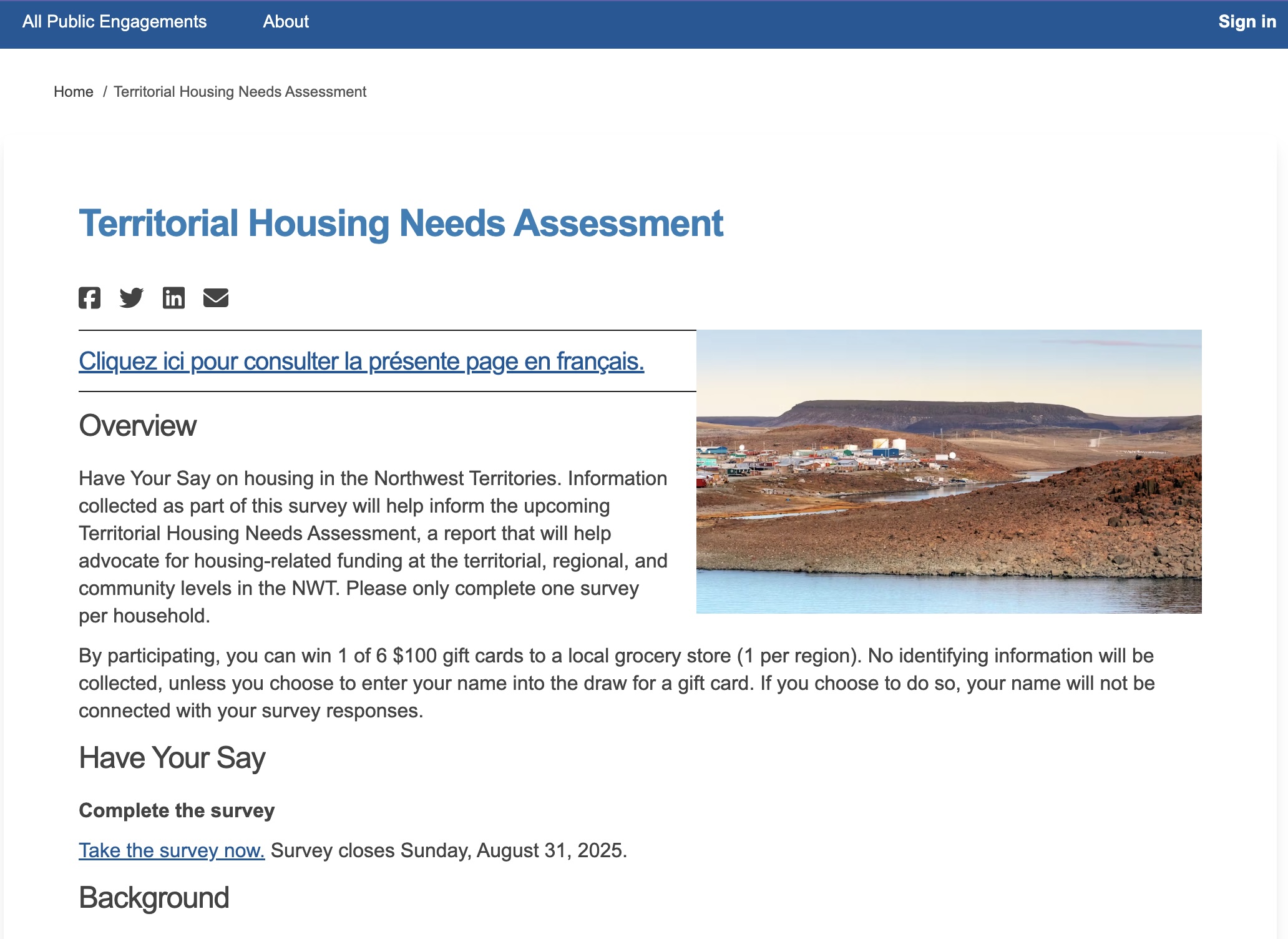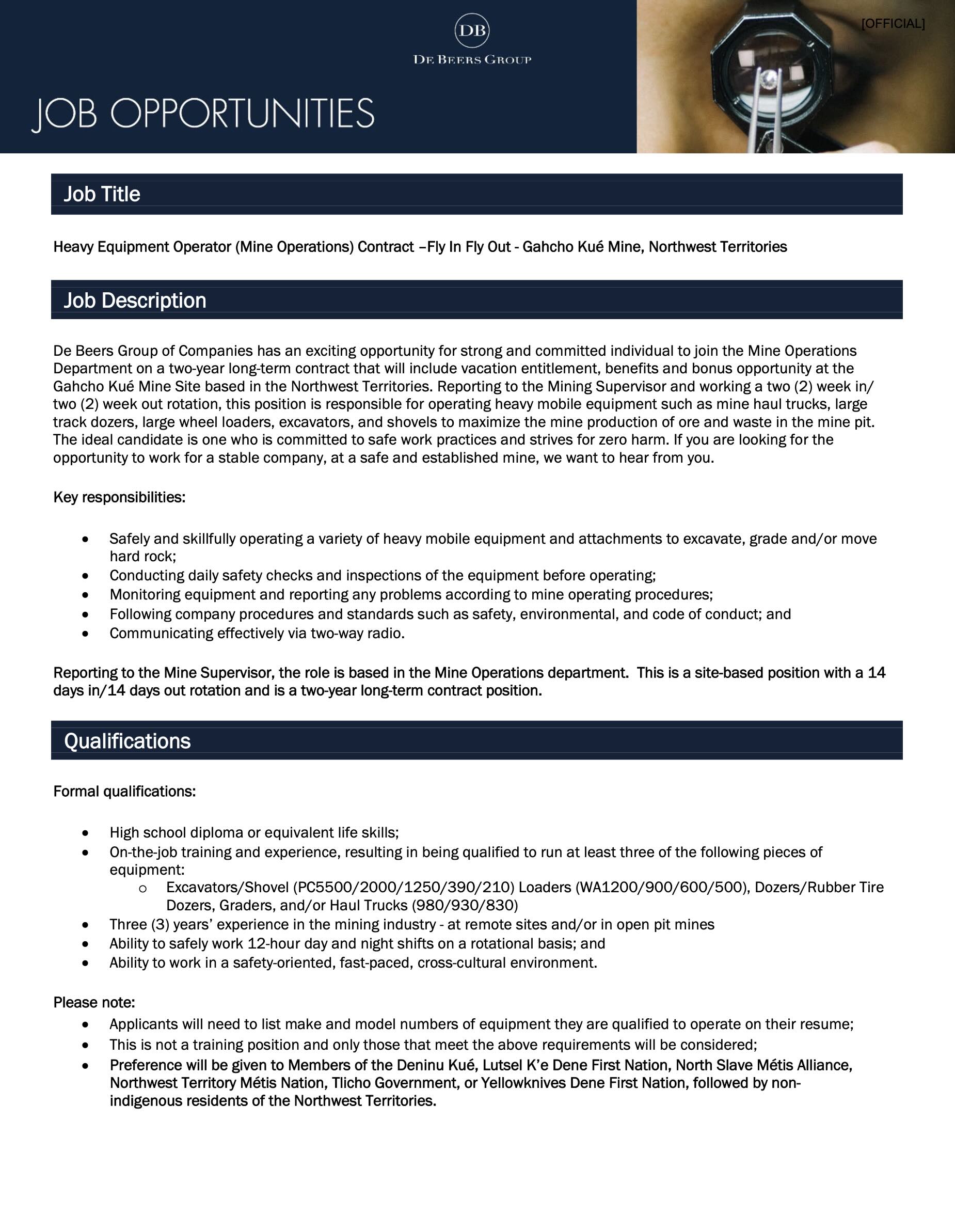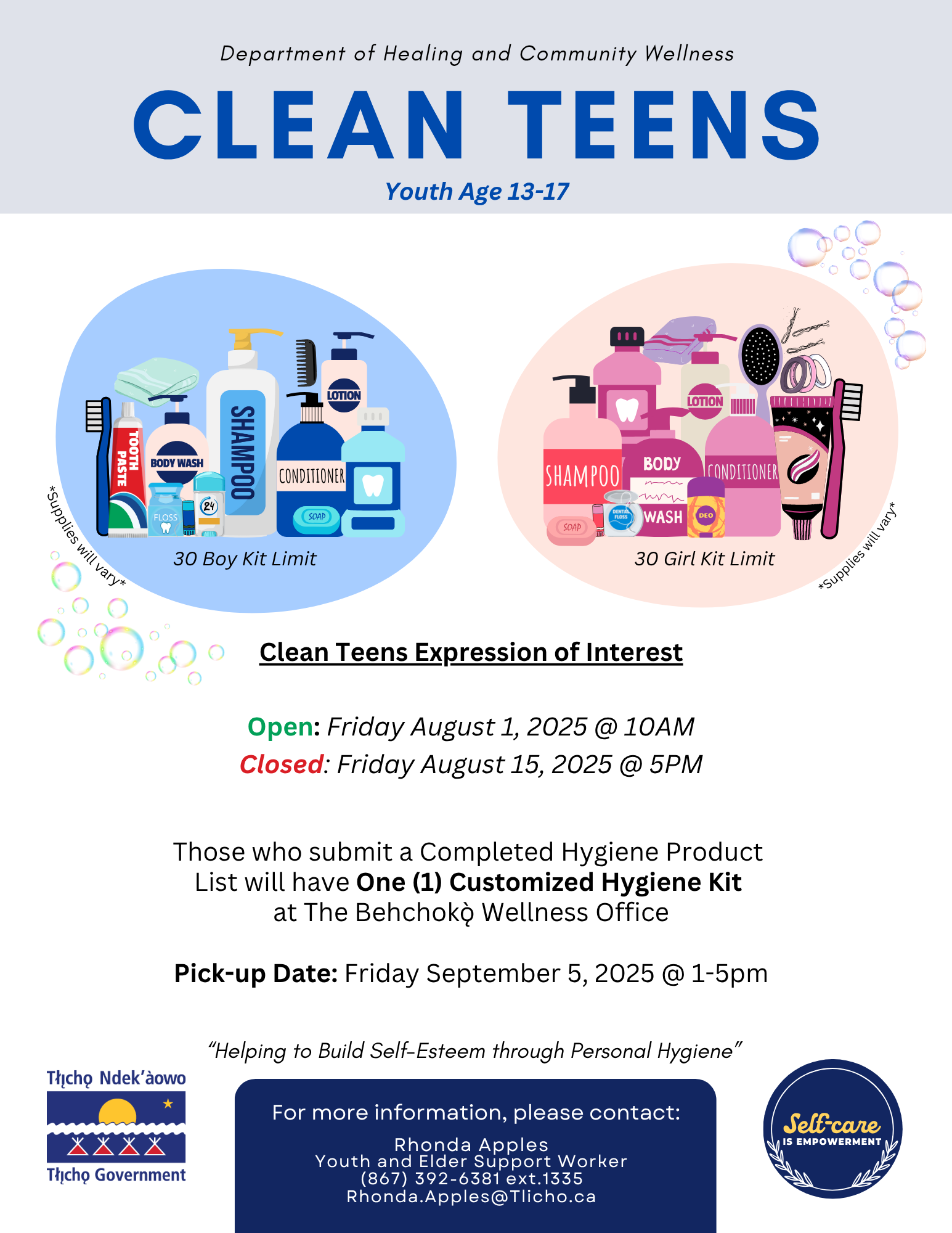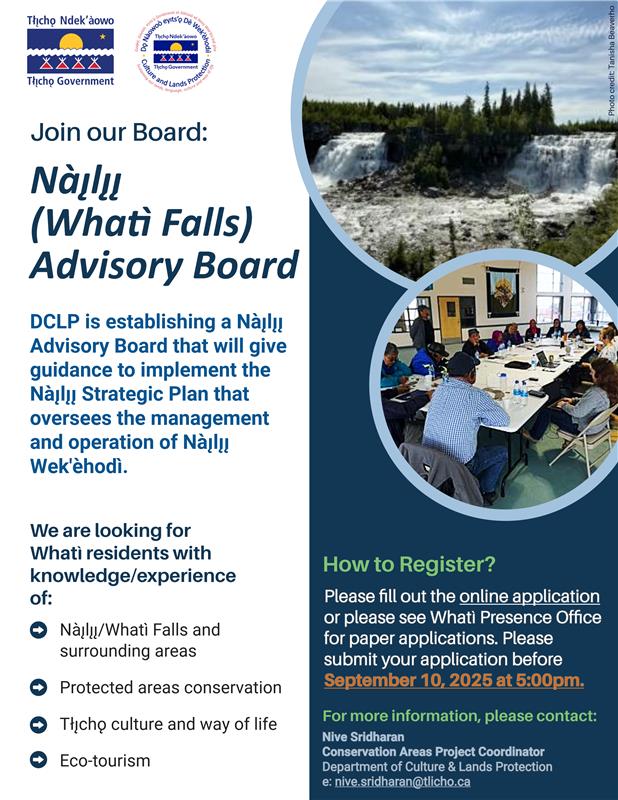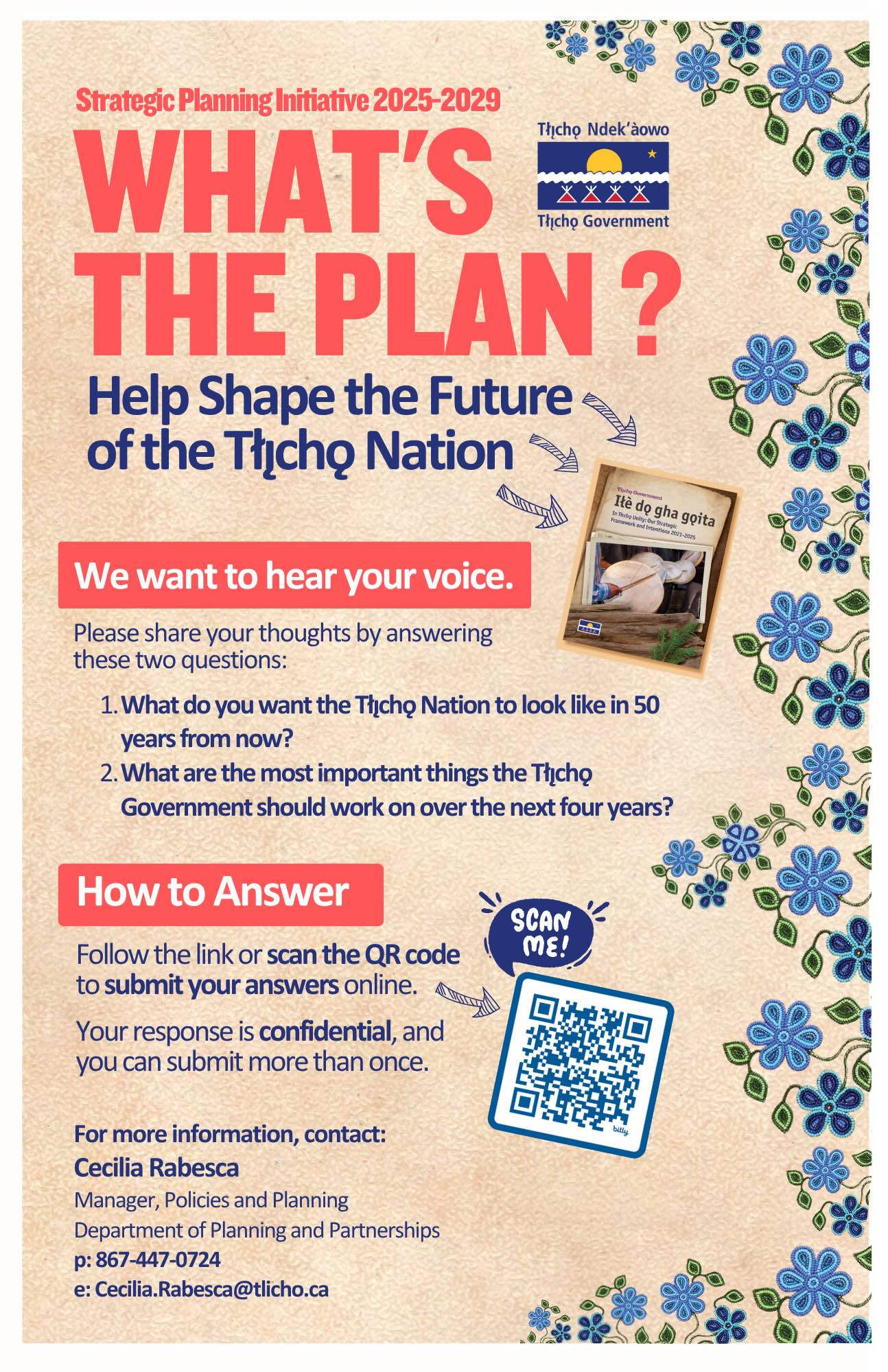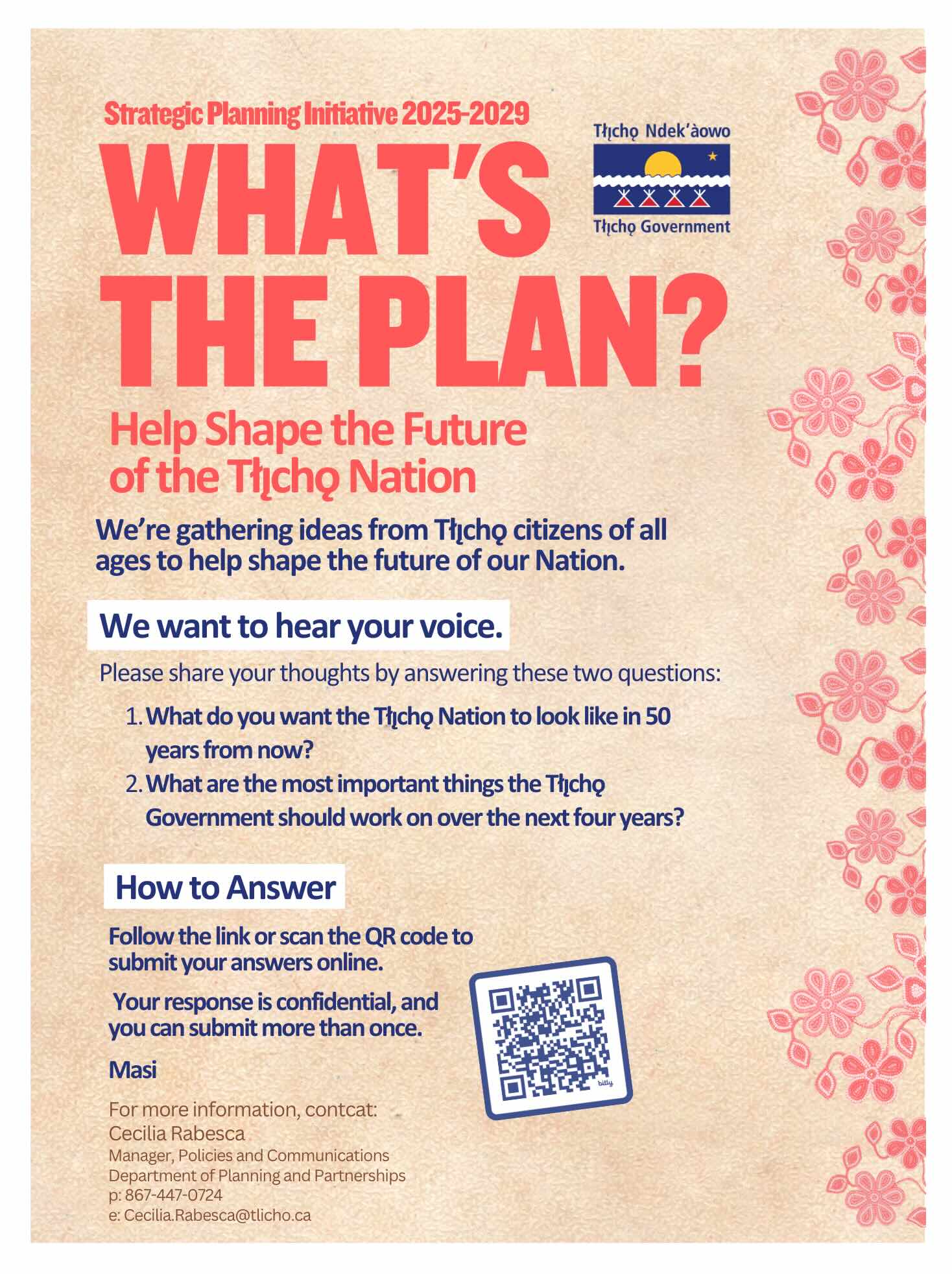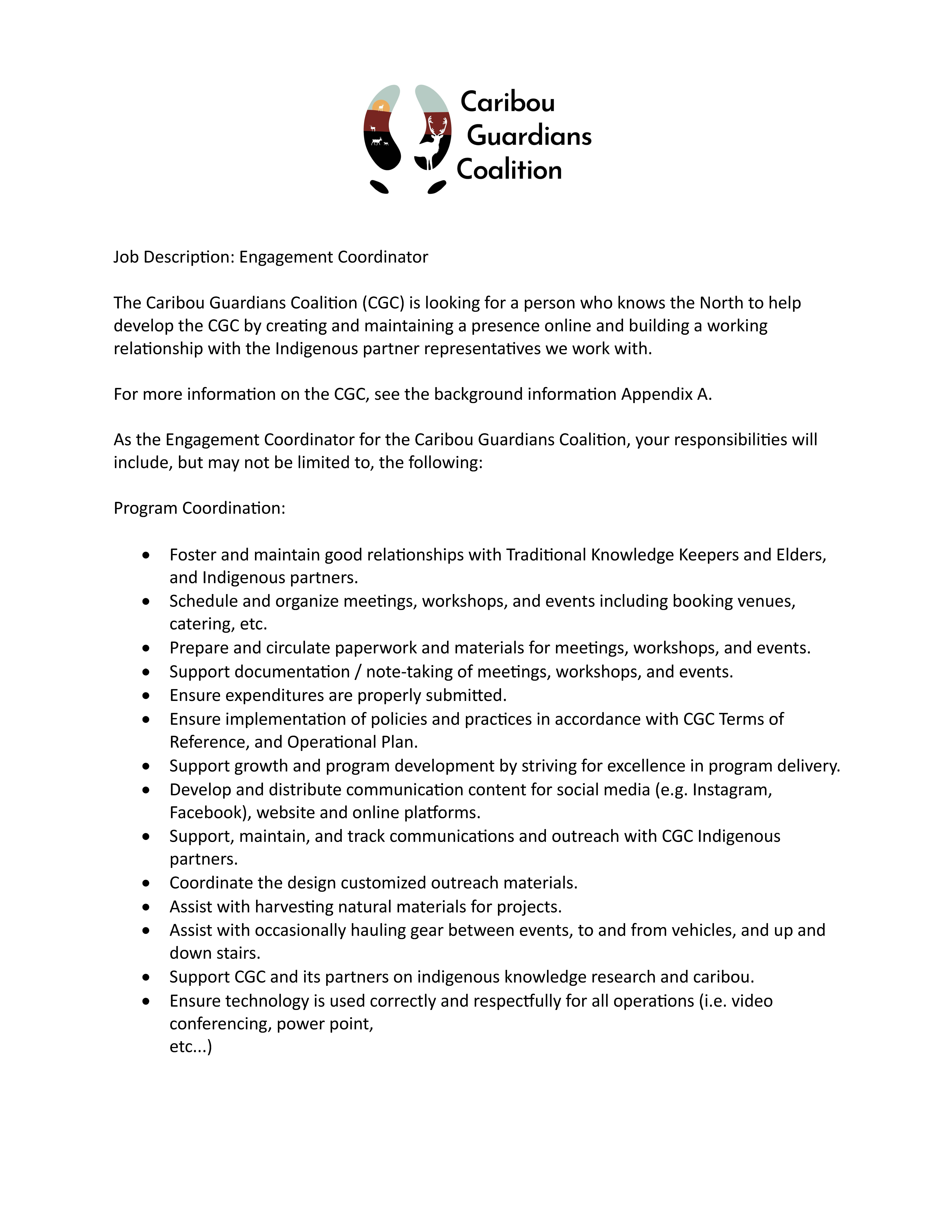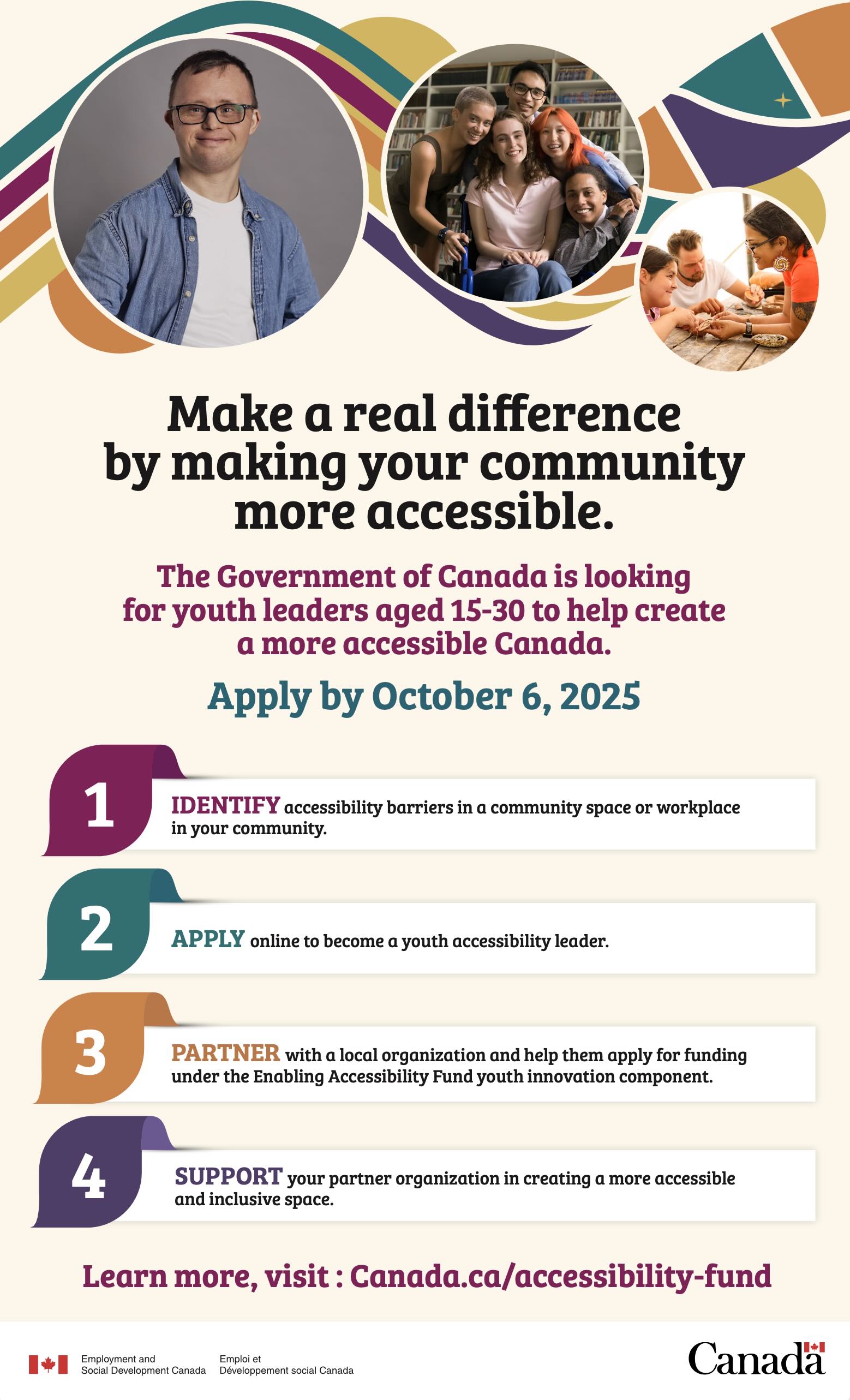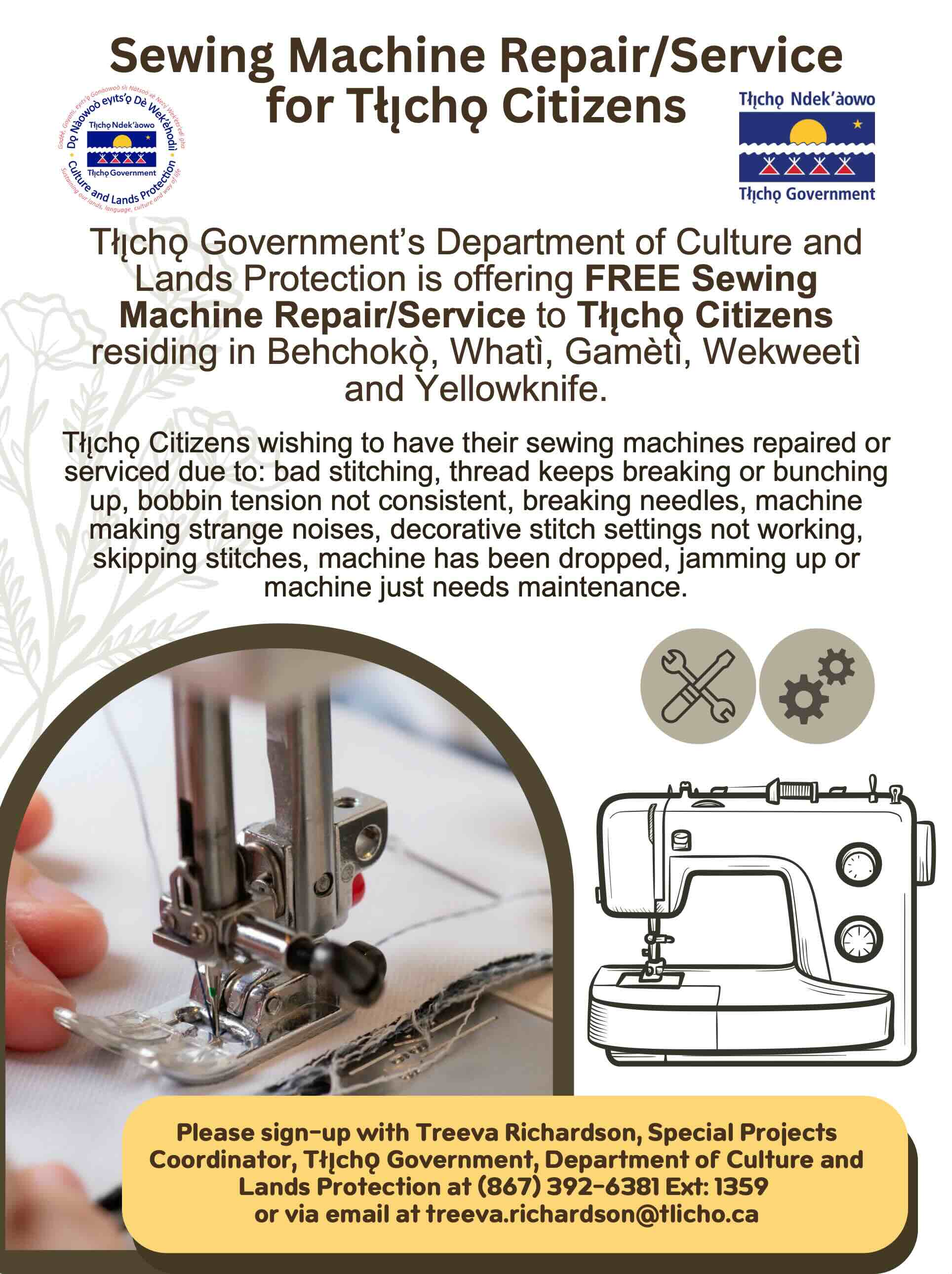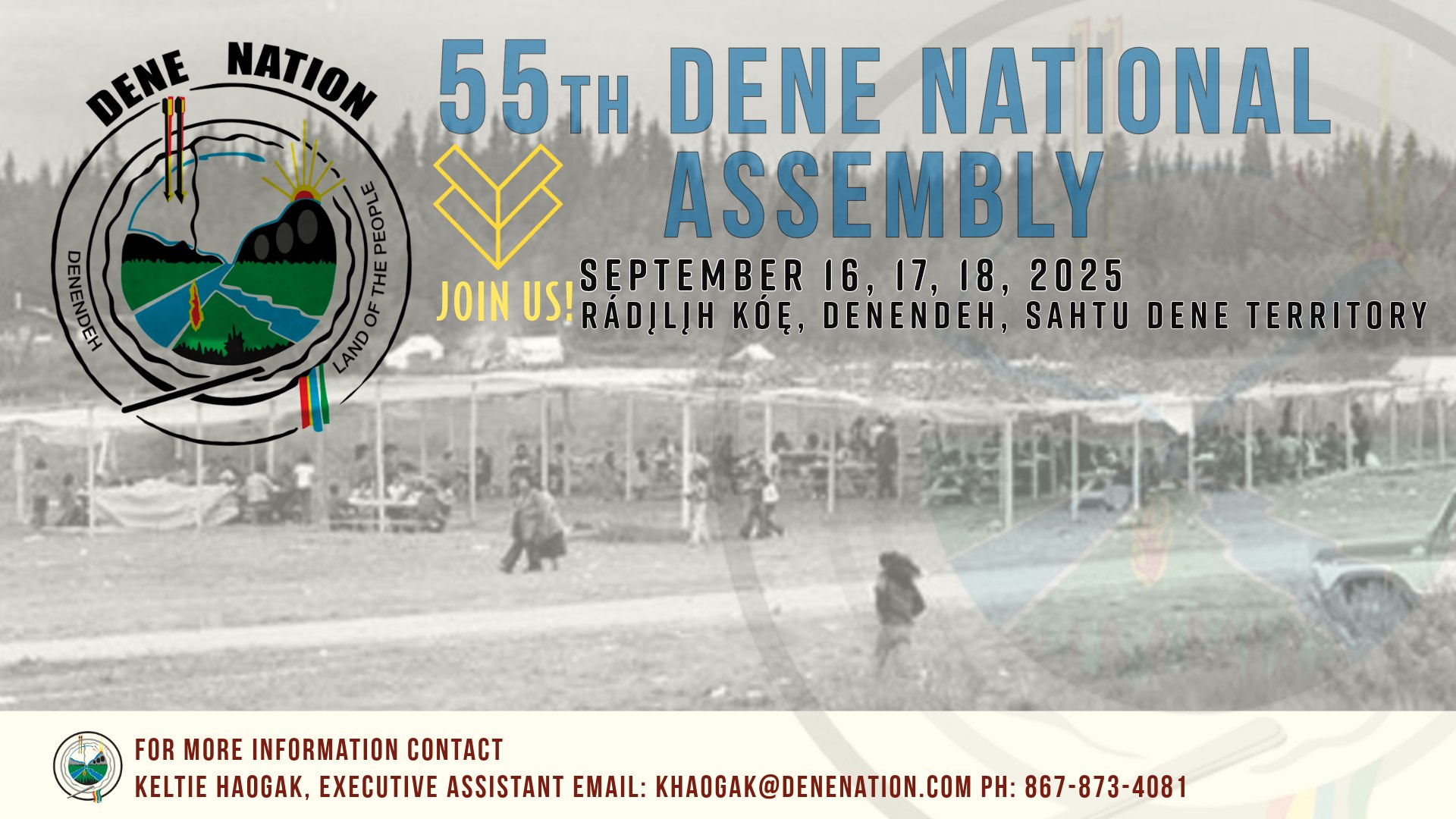UPCOMING EVENTS
August
04 Tłı̨chǫ Dzędeè Hots'ehtsı - Tłı̨chǫ Day Celebration In Behchokǫ̀
Date:
Time:
Location:
Community:
1:00PM: COMMUNITY BBQ
Location: Culture Centre parking lot
2:00PM: ADULTS CASH EVENTS
Log splitting, nail pounding, log sawing, egg toss, tug-o-war
Location: Outside Culture Centre
2:00PM: YOUTH & KIDS CASH EVENTS
100 meter race, egg spoon race, potato sack race, egg toss, tug-o-war
Location: Outside Culture Centre
3:00PM: MINI HANDGAMES TOURNAMENT
$20 buy in, youth included (see BPO foremen for details)
Location: Culture Centre hall
2:00PM: HORSESHOE TOURNAMENT
Entry fee: $20 per person, register with BPO foremen
Location: Outside white dome
5:00PM: LIVE BAND
Enjoy live performance band
Location: Culture Centre parking lot
5:00PM: TALENT SHOW (all ages)
Cash prizes for best traditional dressed, animal call, jigging, & Tlicho love song
Location: Culture Centre parking lot
COMMUNITY DRUM DANCE TO FOLLOW
Location: Culture Centre hall
*DRUGS & ALCOHOL FREE EVENT'S*
04 Employment Opportunity: TRAILS OF OUR ANCESTORS 2025
Date:
Time:
Location:
Tłı̨chǫ Government - Department of Culture & Lands Protection is seeking individuals interested in assisting with the arrival of the Trails of our Ancestors paddlers at Marion Village (What & Gamètì paddlers), Slemon Lake (Wekweètì paddlers) and Goloodi (main meeting place for all paddlers) scheduled from August 6th to 10th, 2025
Marion Village
The following positions are available for hire at Marion Village:
- 1 - Wildlife Monitors
- 1 - Camp Foreman
- 4 - Cooks
- 2 - Boat Drivers (overnight)
- 2 - Boat Helpers (overnight)
- 4 - Boat Drivers (daily - transport & tow - August 8 to 10)
- 4 - Boat Helpers (daily - assist with transport & tow - August 8 to 10)
_____________________________________________________________________________
Slemon Lake:
The following positions are available for hire at Slemon Lake:
- 1 - Wildlife Monitors
- Camp Foreman
- Cooks
- 2 - Boat Drivers (overnight)
- 2 - Boat Helpers (overnight)
- 4 - Boat Drivers (daily - transport & tow - August 8 to 10)
- 4 - Boat Helpers (daily - assist with transport & tow - August 8 to 10)
_____________________________________________________________________________
Gòloodıì
The following positions are available for hire at Marion Village:
- 1 - Wildlife Monitors
- 1 - Camp Foreman
- 4 - Cooks
- 2 - Boat Drivers (overnight)
- 2 - Boat Helpers (overnight)
- 4 - Boat Drivers (daily - transport & tow - August 8 to 10)
- 4 - Boat Helpers (daily - assist with transport & tow - August 8 to 10)
_____________________________________________________________________________
To apply, or it you have any questions or concerns, please contact Treeva Richardson at 867-392-6381 ext. 1359 or Pam Giroux at 867-392-6381 ext. 1353.
04 Whatì Class 5 Driver’s Training
Date:
Time:
Location:
Community:
This course is designed for new drivers, focusing on building a solid foundation of driving habits, attitude, and skills to become a safe and cooperative driver.
Course Information:
- Start Date: August 18, 2025
- End Date: September 3, 2025
- 15 seats available
- Must be a Tłı̨chǫ Citizen
Application Deadline: Monday August 4, 2025
Contact information:
Marlene Wedawin
Career Development Coordinator
Ph: 867-573-3012 Ext: 1406
Email: [email protected]
For more information, contact:
Lily Ann Kodzin,Manager, Career Development & Apprenticeship
Department of Client Services
(867) 492-3676
[email protected]
www.tlicho.ca
600 Nihtl Eko Tili, P.O Box 412, Behchokǫ̀, NT X0E 0Y0
05 PUBLIC NOTICE Justice and Victim Services Office Temporary Closure
Date:
Time:
Location:
Community:
Please be advised that our office will be closed in observance of Tłı̨chǫ Day (August 4) and the Civic Holiday (August 5).
Regular office hours will resume on Wednesday, August 6, 2025, at 9:00 AM.
If you require assistance, please leave a message with the Justice and Victim Services Desk at 867-392-1700 ext. 1709. An assistant will be available to provide support or follow up with you as soon as possible.
In case of emergency, please call 911.
Thank you for your understanding, and we wish everyone a safe and enjoyable holiday!
06 Employee Opportunity: Tłı̨chǫ Annual Assembly
Date:
Time:
Location:
Community:
The Tłı̨chǫ Annual Assembly is seeking casual employment for the following positions. (Aug 10 - 16, 2025).
If you are interested please submit your name and information with the Behchokò Presence Office reception.
- LABOUR WORKERS
- SECURITY
- COOKS
- JANITORS
Deadline to sign up: Wednesday, August 6 at 5:00pm
For More Information Contact The Behchokǫ̀ Presence Office: 867-392-6385 Or
Email: [email protected]
07 Call of Interest Tłı̨chǫ Artists - Annual Gathering Arts & Crafts Showcase (Aug. 11-14)
Date:
Time:
Location:
Community:
Showcase Your Talent At the 2025 Annual Gathering Special Arts & Crafts Showcase in Behchokǫ̀.
All Tłı̨chǫ citizen artists are invited to participate!
Whether you bead, carve, paint, sew or create in any form
This is a great opportunity to:
- display and sell your work
- celebrate culture and creativity
- connect with the community
- inspire others with your talent
Showcase Details
- August 11 - 14, 2025
- 10 am - 5 pm each day
- Behchokò's Community Arbor (Outside The Culture Center)
- 10 Artists for 2 Days Each
DEADLINE TO REGISTER - AUGUST 7th AT NOON
Register Online: https://bit.ly/4obW9z4
For more information, contact:
Rebecca Chocolate, Economic Development Officer
Economic Development Division
Department of Client Services
867-997-3074 Ext: 1503 / [email protected]
08 A Guide To Selling Your Artwork Workshop
Date:
Time:
Location:
Community:
DATE: August 13, 2025
TIME: 6-9 PM
LOCATION: EMES IN Behchoko
Workshop Agenda
- Introduction to Selling Your Artwork
- The Artist Portfolio
- Pricing Your Artwork
- Selling Direct to Consumers: In-Person Sales, Social Media Selling and E-commerce Website
- Marketing Your Artwork, Selling Through Retailers and Galleries
- We will also be covering Point of Sale System (Square Cards) and helping to setup account on App
To register, please send an email to: [email protected]
We encourage clients who sign up for our Christmas Showcase to participate in this workshop.
For more information, contact:
Carol Arrowmaker, Economic Development Officer Economic Development Division Department of Client Services 867-713-2511 Ext: 1604 / [email protected]
11 21st Tłı̨chǫ Annual Gathering & 1st Session of the 6th Tłı̨chǫ Assembly Behchokǫ̀ and 20th Anniversary of the Tłı̨chǫ Agreement (Aug. 11-14)
Date:
Time:
Location:
Community:
11 Tłı̨chǫ Student Support Packages Program
Date:
Time:
Location:
Community:
The Tłı̨chǫ Post-Secondary Support Programs (TPSSP) Division in the Department of Client Services is pleased to announce the Student Support Package Pilot Program,
designed to equip incoming Tłı̨chǫ post-secondary students with essential tools for academic success—no matter where they study.
Each package—shaped by direct community feedback—includes:
- School supplies (notebooks, pens, highlighters, calculator, USB, earbuds)
- Planning tools (planner, calendar, filing system)
- Wellness items (reusable water bottle, healthy snacks)
Apply by: August 11, 2025, at 5:00 PM
Distribution: August 18 – September 30, 2025 (home delivery, office pickup, or regional shipping)
How to Apply?
- Online: Online Application Form
- PDF Download: Student Support Package Application - Fillable.PDF
For more information:
Justine Knapton-Pain
Manager, Tłı̨chǫ Registrar & Post-Secondary
Tel: (867) 392-1700 ext. 1706
E: [email protected]
Brought to you by:
Tłı̨chǫ Post-Secondary Support Programs
Department of Client Services
E: [email protected] | [email protected]
Tel: (867)-392-1700 ext: 1715 | Fax: (867)-392-6884
15 Grand Chief Nomination – Behchokǫ̀
Date:
Time:
Location:
Community:
The Grand Chief Nominations will be announced on August 15th, 2025 after the Tłı̨chǫ Annual Gathering and Assembly.
Eligible voters will be able to vote starting September, and have 5 different options to submit their vote for the 2025 Tłı̨chǫ Grand Chief Election.
SPECIAL MOBILE POLL
Special Mobile Poll is an option made available for eligible voters with accessibility barriers. This option is available by request only and will take place on September 9, 2025. Please contact the Office of the Registrar prior to September 9, 2025 if you would like to arrange this option.
MAIL-IN BALLOT
Between September 2, 2025 to September 26, 2025 at noon, eligible voters who are away during regular poll dates can request a Mail-In Ballot by contacting the Office of the Registrar.
All Mail-In Ballots must be returned to the Office of the Registrar by September 29, 2025 at 8:00 p.m. to be counted.
ONLINE VOTING
Online Voting will be available to all eligible voters between September 2, 2025 to September 12, 2025 at noon. For full instructions on how to submit an online vote, please go to the Online Voting tab of the website.
ADVANCE POLL
Advance polling stations will be open in Behchokǫ̀, Whatı̀, Wekweètı̀, Gamètı̀, and Yellowknife on September 19, 2025 from 9:00 a.m. to 8:00 p.m.
For more information about the exact location of each polling station, please refer to the Polling Stations page.
ELECTION DAY
Polling stations for Election Day will be open in Behchokǫ̀, Whatı̀, Wekweètı̀, Gamètı̀, and Yellowknife on September 29, 2025 from 9:00 a.m. to 8:00 p.m.
For more information about the exact location of each polling station, please refer to the Polling Station Locations page.
VOTER ELIGIBILITY
According to Tłı̨chǫ Grand Chief Nomination and Election Law, a person is eligible to vote for Grand Chief if you:
1.) are a Tłı̨chǫ Citizen;
2.) have reached the age of 18 by September 28, 2025; and
3.) have been a resident of Mǫwhı̀ Gogha Dè Nı̨ı̨tłèè since September 28, 2023, except for absence due to medical, incarceration, education, or similar reasons.
For more information, visit https://www.tlichoelection.com/
To check if you are on the Voters list, contact [email protected] or 867-765-8975
Images:
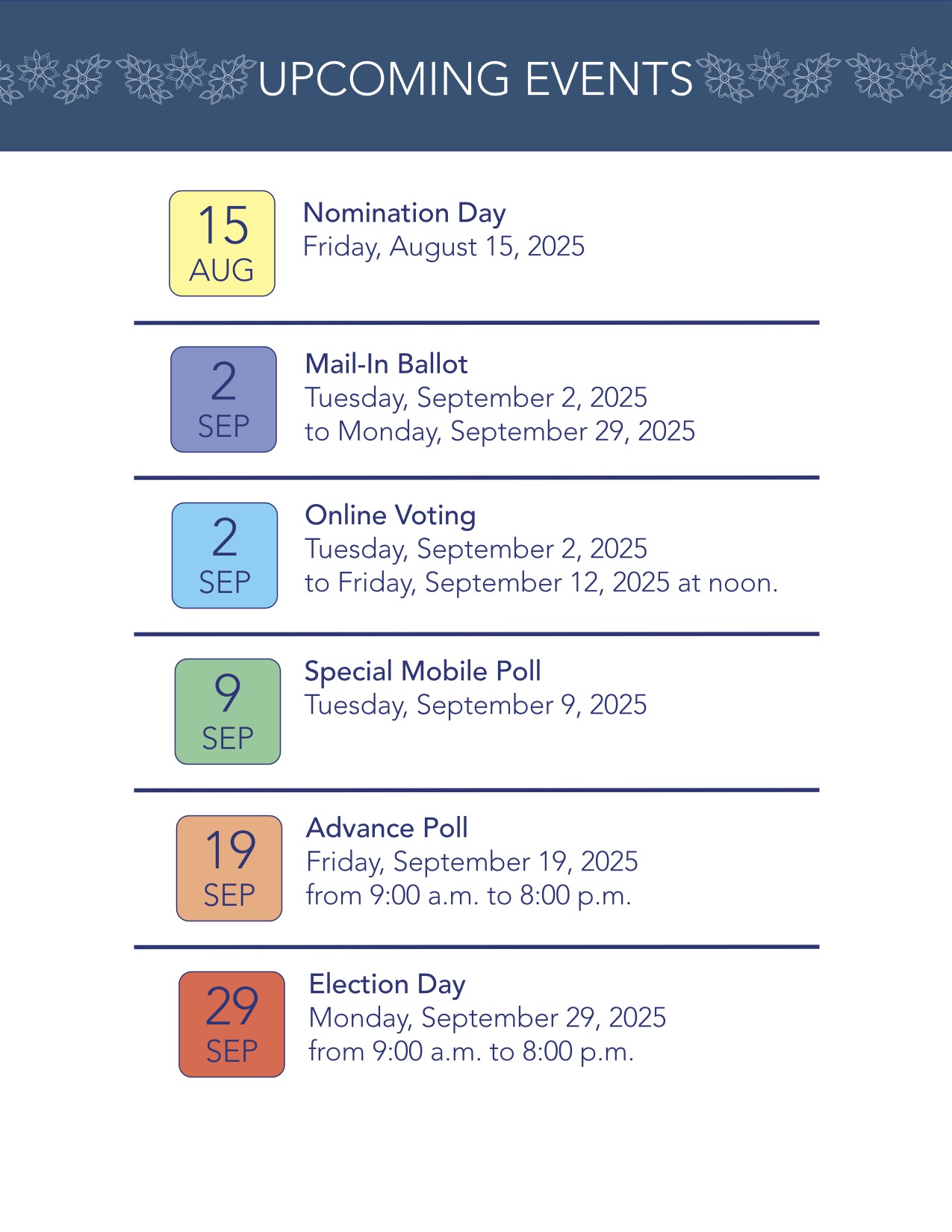
15 EXPRESSION OF INTEREST: Board Member Representing Behchokò at Tłı̨chǫ Community Services Board
Date:
Time:
Location:
Community:
We are seeking a dedicated and passionate individual to represent Behchokò as a Board Member on the Tłı̨chǫ Community Services Board.
If you are a resident of Behchokò with a strong commitment to community service and leadership, we encourage you to apply.
Please submit the following documentation:
- Letter of Interest: Highlighting your areas of interest, experiences, commitments, and;
- Resume
Closing Date: 3:00 pm on August 15, 2025
Email your Expression of Interest and Resume to [email protected]
15 WSCC SUPERVISOR SAFETY TRAINING
Date:
Time:
Location:
Community:
This course is designed for workplace Supervisors Training and will cover key safety responsibilities, including hazard recognition, incident reporting, and effective communication in the workplace. Participants will gain practical knowledge to help maintain a safe work environment.
A current criminal record check may be required to attend training, depending on the participant's role or employer policies.
A certificate of completion will be issued.
Deadline to apply: August 15, 2025
Course Information
- Community: Behchokǫ̀, NT
- Dates: September 9-10, 2025
- Hours: 9 AM to 5 PM
- Location: Sportsplex - Mezzanine 2nd Floor
- Must be 16 and over
- Limited course seats: 6 seats maximum
Register with
Tianna Migwi, Senior Coordinator
Justice & Victim Services Division
Department of Client Services
867-392-1700 ext. 1704
[email protected]
-or-
Abbigail Rabesca, Coordinator
Justice & Victim Services Division
Department of Client Services
867-392-1700 ext. 1709
[email protected]
15 20th Anniversary of the Tłı̨chǫ Agreement $100,000 Men's Handgames Tournament - Aug. 15-17
Date:
Time:
Location:
Community:
AUG 15-17, 2025 The Behchokǫ̀ Presence Office
ENTRY FEE:
- $1800.00 PER TEAM
- $200.00 PER PERSON
AGE:
- 16 YEARS AND OVER (2 youth optional; must be 14 yrs old)
TEAM:
- 9 players per team
- (8 players & 1 alternate)
TO REGISTER PLEASE CONTACT BPO STAFF:
Titus Rabesca-Lafferty
T: 867-492-4668
Reshinda Eyakfwo
T: 867-688-0136
17 Summer Carnival (Aug. 16-17)
Date:
Time:
Location:
Community:
25 On the Land Mental Health Support Training - (Sept. 15-19)
Date:
Time:
Location:
Community:
This program will train Tłı̨chǫ cultural instructors, camp workers, and safety personnel to respond to participants' mental health needs using trauma informed care.
Those who complete the certificate program will be added to the priority list for casual hires in all future On-the-Land Healing programming.
- Travel/Accommodation Provided
- 15 Participants
- Open to All Communities
Apply Today: https://form.jotform.com/251917167377265
Deadline: August 25th
For more information, contact:
Tephaine Wedawin
On The Land Healing Manager
Tel: 867-573-3012
Email: [email protected]
31 Behchokǫ̀ Ełèhot'ı̨ı̨ Hotıı̀ Geeda gha Ełets'àts'edıı - Healthy Families Program August Calendar
Date:
Time:
Location:
Community:
Healthy Families Program is offering Healthy Cooking & Craft Classes for Pre/ Postnatal Families, Care Givers, & Grandparents with Children 6yrs and under.
We provide Healthy snacks for each class. Parents that want to participate in the Programs can call or text or drop by at Charlie Charlo Center
Tłıchǫ word of the month Tłıchǫ
For more information, you can contact Kary Lynn Lafferty at 867- 392-2742 or Email me at [email protected]
31 Whatì Ełèhot'ı̨ı̨ Hotıı̀ Geeda gha Ełets'àts'edıı - Healthy Families Program August Calendar
Date:
Time:
Location:
Community:
The Healthy Babies & Healthy Families program supports and provides information to expecting mothers, postnatal mothers, and children ages 0-6.
This program provides an opportunity for families to come together and engage in baking/cooking, craft, child development, and Tłı̨chǫ way of life activities
Mon & Wed programs: 9am-5pm | Tues & Thurs programs: 5pm-8pm
For more information, or to book parenting sessions, please contact
Caroline Jeremick’ca
Phone: 867 573-3012 Ext: 1405
Email: [email protected]
31 TERRITORIAL HOUSING NEEDS ASSESSMENT SURVEY
Date:
Time:
Location:
Community:
The Territorial Housing Needs Assessment (THNA) survey opens today, giving residents across the Northwest Territories a chance to share their experiences and priorities when it comes to housing.
This is the first time in over 20 years that a housing study of this scale has been done across the entire NWT. The THNA will give a clear, up-to-date picture of housing challenges at the community, regional, and territorial levels, and help shape better housing programs and funding decisions.
Survey Link: https://bit.ly/4m4TTYI
The final report will be public and available to support advocacy efforts—not just for the Government of Northwest Territories, but for Indigenous governments, community governments, and housing providers across the territory.
Residents can take part by completing an online survey from July 21, 2025, until August 31, 2025. Responses will help ensure that real-life experiences are reflected in the data and inform housing solutions that work for Northern communities.
To learn more and take the survey, visit: https://haveyoursay.nwt-tno.ca/territorial-housing-needs...
September
01 Labour Day
Date:
Time:
Location:
Community:
02 Gahcho Kué Mine Job Opportunities: Heavy Equipment Operator
Date:
Time:
Location:
Community:
De Beers Group of Companies has an exciting opportunity for strong and committed individual to join the Mine Operations Department on a two-year long-term contract that will include vacation entitlement, benefits and bonus opportunity at the Gahcho Kué Mine Site based in the Northwest Territories. Reporting to the Mining Supervisor and working a two (2) week in/ two (2) week out rotation, this position is responsible for operating heavy mobile equipment such as mine haul trucks, large track dozers, large wheel loaders, excavators, and shovels to maximize the mine production of ore and waste in the mine pit.
The ideal candidate is one who is committed to safe work practices and strives for zero harm. If you are looking for the opportunity to work for a stable company, at a safe and established mine, we want to hear from you.
Key responsibilities:
- Safely and skillfully operating a variety of heavy mobile equipment and attachments to excavate, grade and/or move hard rock;
- Conducting daily safety checks and inspections of the equipment before operating;
- Monitoring equipment and reporting any problems according to mine operating procedures;
- Following company procedures and standards such as safety, environmental, and code of conduct; and
- Communicating effectively via two-way radio.
Reporting to the Mine Supervisor, the role is based in the Mine Operations department. This is a site-based position with a 14 days in/14 days out rotation and is a two-year long-term contract position.
Qualifications
Formal qualifications:
- High school diploma or equivalent life skills;
- On-the-job training and experience, resulting in being qualified to run at least three of the following pieces of equipment:
- o Excavators/Shovel (PC5500/2000/1250/390/210) Loaders (WA1200/900/600/500), Dozers/Rubber Tire Dozers, Graders, and/or Haul Trucks (980/930/830)
- Three (3) years’ experience in the mining industry - at remote sites and/or in open pit mines
- Ability to safely work 12-hour day and night shifts on a rotational basis; and
- Ability to work in a safety-oriented, fast-paced, cross-cultural environment.
Please note:
• Applicants will need to list make and model numbers of equipment they are qualified to operate on their resume;
• This is not a training position and only those that meet the above requirements will be considered;
• Preference will be given to Members of the Deninu Kué, Lutsel K’e Dene First Nation, North Slave Métis Alliance,
Northwest Territory Métis Nation, Tlicho Government, or Yellowknives Dene First Nation, followed by non- indigenous residents of the Northwest Territories.
To Apply:
Vist - https://bit.ly/46kfLdQ
05 Clean Teens Expression of Interest (Aug.1-15)
Date:
Time:
Location:
Community:
Open: Friday August 1, 2025 @ 10AM
Closed: Friday August 15, 2025 @ 5PM
Those who submit a Completed Hygiene Product List will have One (1) Customized Hygiene Kit at The Behchokǫ̀ Wellness Office
Pick-up Date: Friday September 5, 2025 @ 1-5pm
"Helping to Build Self-Esteem through Personal Hygiene"
PDF Downloads:
- Clean Teens - Expression of Interest Selection Sheet Youth Boys.pdf
- Clean Teens - Expression of Interest Selection Sheet Youth Girls.pdf
- Tlicho Government Waiver Form Clean Teens.pdf
For more information, please contact:
Rhonda Apple
Youth and Elder Support Worker
(867) 392-6381 ext.1335
[email protected]
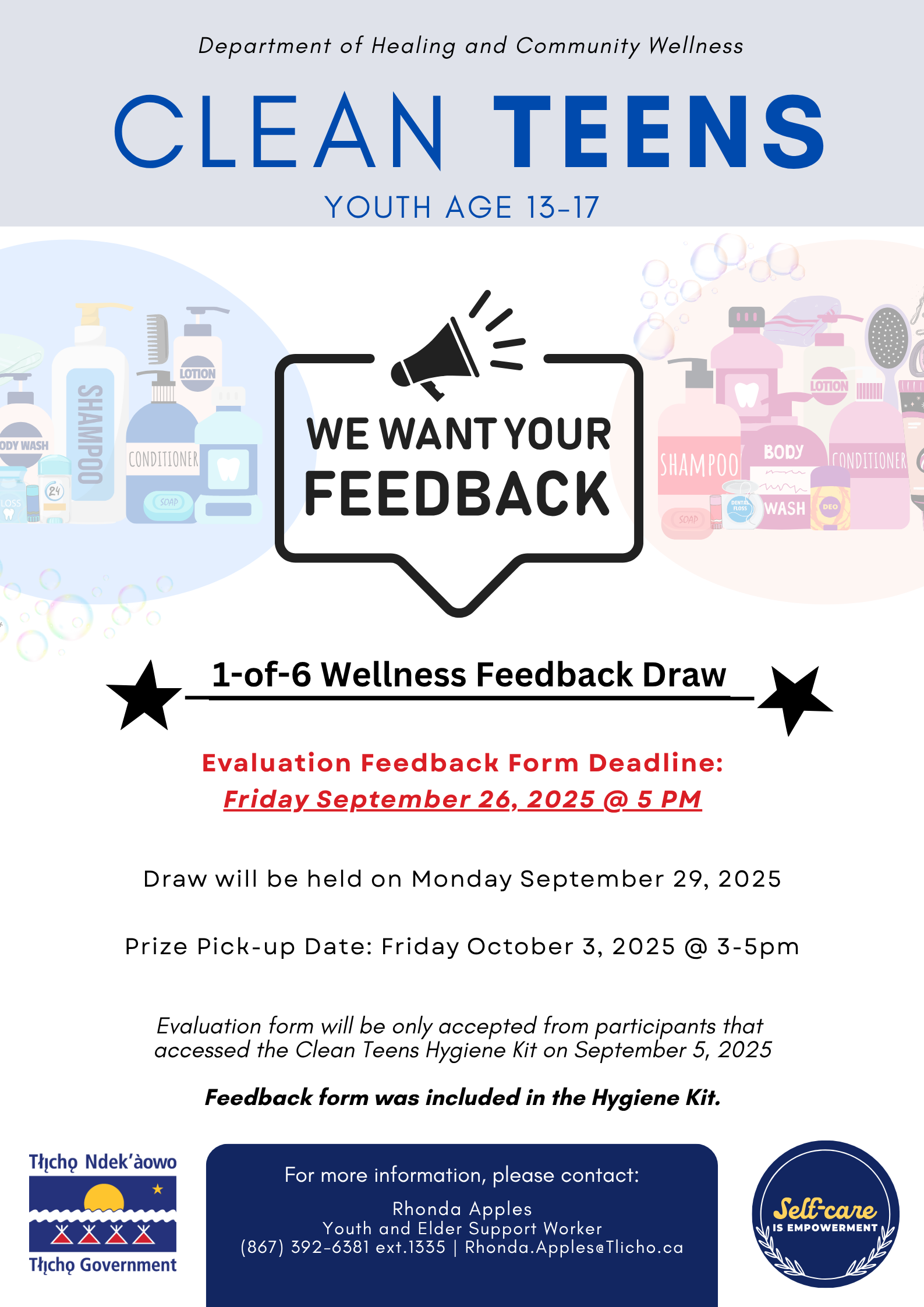
10 Seeking: Nàı̨lı̨ı̨ (Whatì Falls) Advisory Board Member
Date:
Time:
Location:
Community:
The Department of Culture and Lands Protection is establishing a Nàı̨lı̨ı̨ Advisory Board to help guide the implementation of the Nàı̨lı̨ı̨ (Whatì Falls) Strategic Plan. We are seeking applicants from the community of Whatì who have knowledge/experience on:
- Nàı̨lı̨ı̨ (Whatì Falls) and experience with protected areas;
- Tłı̨chǫ culture, language, and way of life; and
- Supporting land stewardship and cultural programs.
Please complete the application form by September 10, 2025 by 5pm.
Apply online: https://bit.ly/4lWyUaV
29 Grand Chief Election
Date:
Time:
Location:
Community:
30 Strategic Planning Initiative 2025-2029 - WHAT'S THE PLAN ?
Date:
Time:
Location:
Strategic Planning Initiative 2025-2029
WHAT'S THE PLAN ?
Help Shape the Future of the Tłı̨chǫ Nation
We want to hear your voice.
Please share your thoughts by answering these two questions:
- What do you want the Tłı̨chǫ Nation to look like in 50 years from now?
- What are the most important things the Tłı̨chǫ
Government should work on over the next four years?
How to Answer
Follow the link - https://bit.ly/3BqkWw1 - and submit your answers online. Your response is confidential, and you can submit more than once.
For more information, contact:
Cecilia Rabesca
Manager, Policies and Planning
Department of Planning and Partnerships
p: 867-447-0724
e: [email protected]
30 What's the Plan? - Help Shape the Future of the Tłı̨chǫ Nation
Date:
Time:
Location:
Community:
Strategic Planning Initiative 2025-2029
We're gathering ideas from Tłı̨chǫ citizens of all ages to help shape the future of our Nation.
We want to hear your voice.
Please share your thoughts by answering these two questions:
- What do you want the Tłı̨chǫ Nation to look like in 50 years from now?
- What are the most important things the Tłı̨chǫ
Government should work on over the next four years?
How to Answer
Follow this link and respond online - Have Your Say - Online Form
You can provide your thoughts in any form that is your preference. For example, a list, graphic organizers, paragraphs, a drawing, an oral or video recording, etc.
You can provide your thoughts/feedback in Tłı̨chǫ or English. If you need any translation or interpretation, the Tłı̨chǫ Government will provide that support. Please let us know at [email protected], and we can make those arrangements.
Your response is confidential, and you can submit more than once.
Masi
For more information, contact:
Cecilia Rabesca
Manager, Policies and Communications
Department of Planning and Partnerships
p: 867-447-0724
e: [email protected]
30 JOB POST: Caribou Guardians Coalition (CGC) - Engagement Coordinator
Date:
Time:
Location:
Community:
October
06 Enabling Accessibility Fund - Call for Proposals
Date:
Time:
Location:
Community:
Make a real difference by making your community more accessible.
The Government of Canada is looking for youth leaders aged 15-30 to help create a more accessible Canada.
Apply by October 6, 2025
1. IDENTIFY accessibility barriers in a community space or workplace in your community.
2. APPLY online to become a youth accessibility leader.
3. PARTNER with a local organization and help them apply for funding under the Enabling Accessibility Fund youth innovation component.
4. SUPPORT your partner organization in creating a more accessible and inclusive space.
Learn more, visit: Canada.ca/accessibility-fund
December
20 Free Sewing Machine Service (May - Dec 2025)
Date:
Time:
Location:
Community:
Tłı̨chǫ Government’s Department of Culture and Lands Protection is offering FREE Sewing Machine Repair/Service to Tłı̨chǫ Citizens residing in Behchokǫ̀, Whatı, Gamètı, Wekweetı ̀ and Yellowknife.
Tłı̨chǫ Citizens wishing to have their sewing machines repaired or serviced due to: bad stitching, thread keeps breaking or bunching up, bobbin tension not consistent, breaking needles, machine making strange noises, decorative stitch settings not working, skipping stitches, machine has been dropped, jamming up or machine just needs maintenance.
Please sign-up with Treeva Richardson, Special Projects Coordinator, Tłı̨chǫ Government, Department of Culture and Lands Protection at (867) 392-6381 Ext: 1359 or via email at [email protected]
September
16 Dene Nation Announces the 55th Dene National Assembly
Date:
Location:
[July 22, 2025, Radįlįh Kóe, Denendeh] – The Dene Nation is pleased to announce that the 55th Dene National Assembly will take place from September 16 to 18, 2025, in the beautiful community of Radįlįh Kóe (Ft. Good Hope), located in the Sahtu Dene Territory. This significant event will bring together leaders, elders, and community members from across the Dene Nation to discuss and strategize on key issues affecting their people and lands.
The decision to host the assembly in Radįlįh Kóe was made with careful consideration of the seasonal challenges posed by wildfires. By selecting these dates, the Dene Nation aims to ensure the safety and well-being of all participants, while also providing an opportunity to engage in meaningful dialogue and cultural exchange in a serene and secure environment.
The Dene National Assembly serves as a vital platform for the Dene people to unite, share knowledge, and strengthen their collective voice. It is an opportunity to celebrate their rich cultural heritage, Dene rights, and chart a course for the future. Attendees can expect a series of discussions and cultural events to bring us together on issues of common concern.
The Dene Nation invites all interested parties to join this important gathering. Further details regarding the agenda and registration will be made available in the coming weeks.
For more information, please contact:
Leanne Goose
Email: [email protected]
Phone: 587-986-6215
-30-
